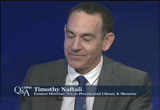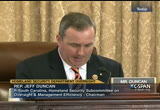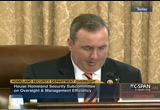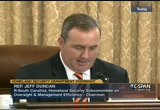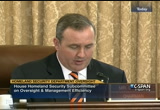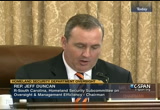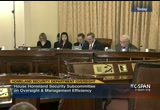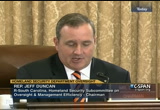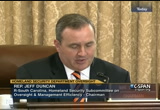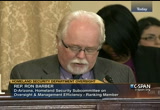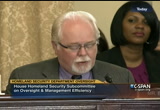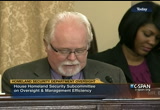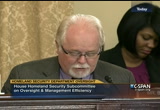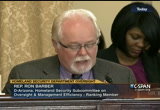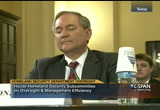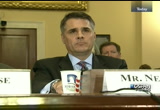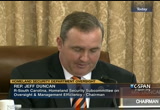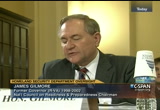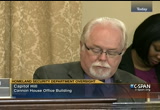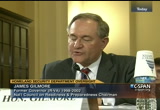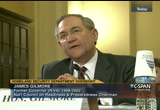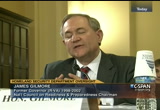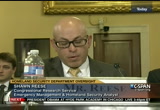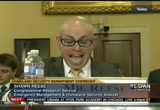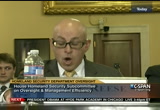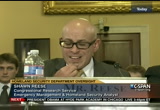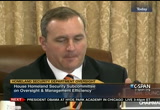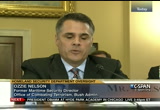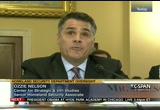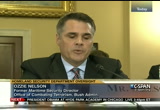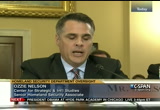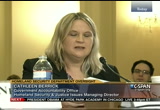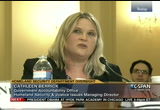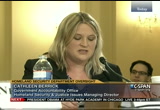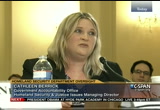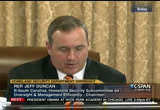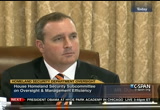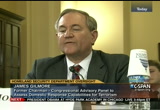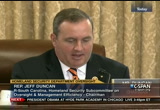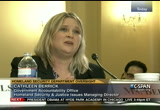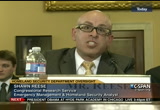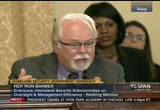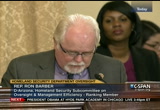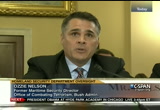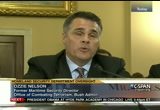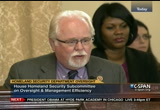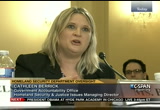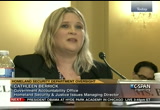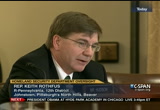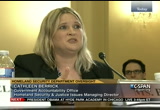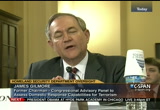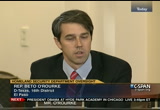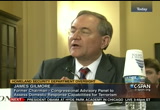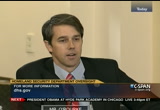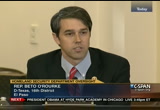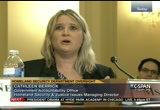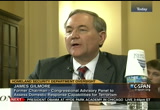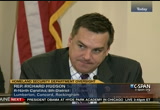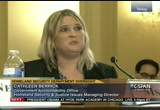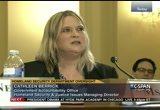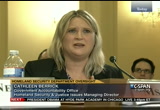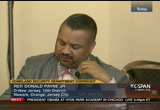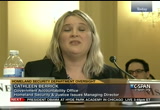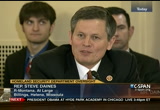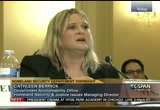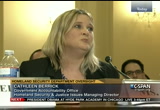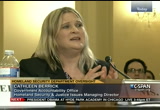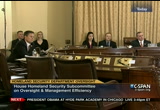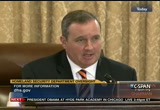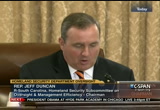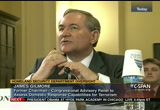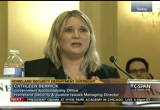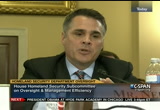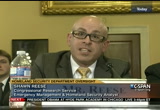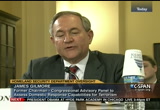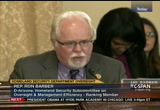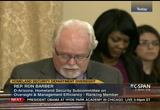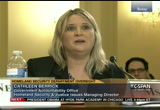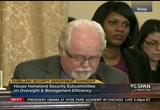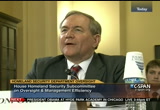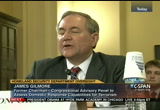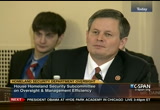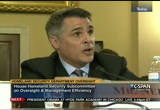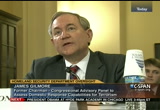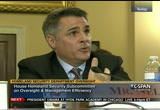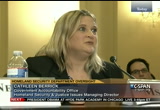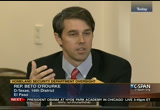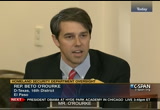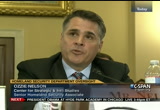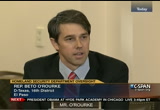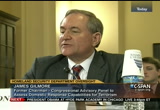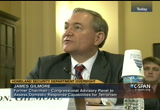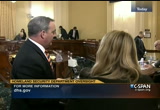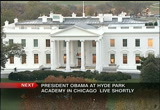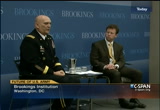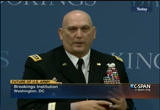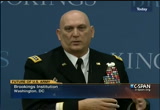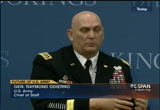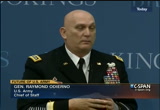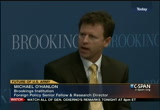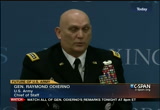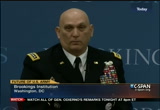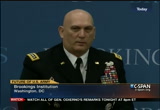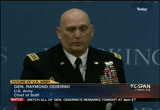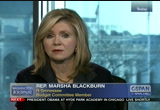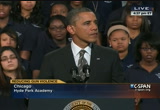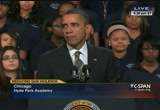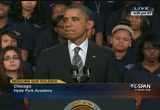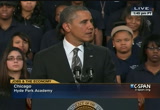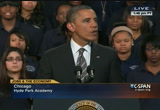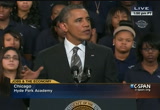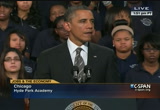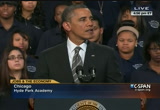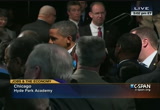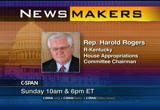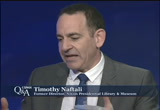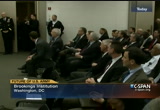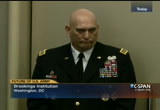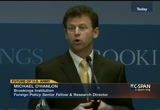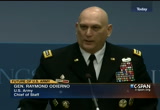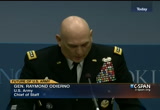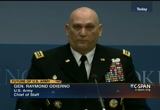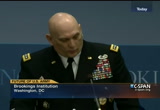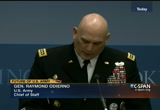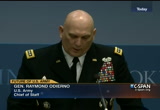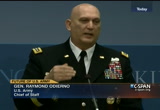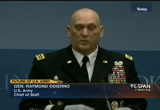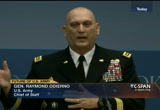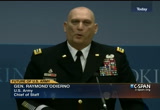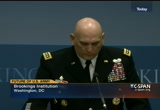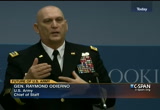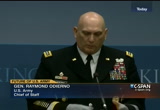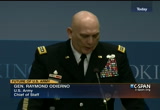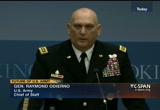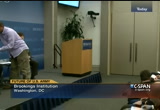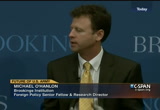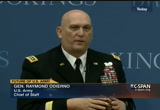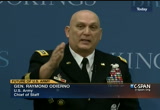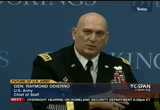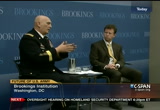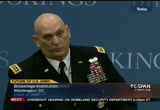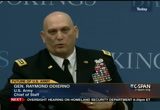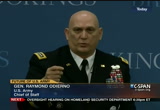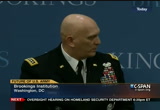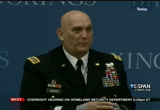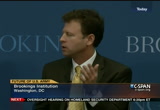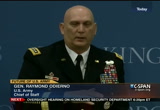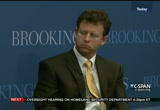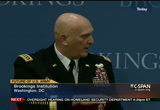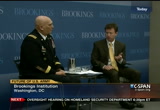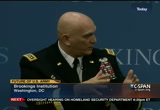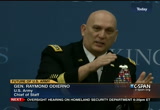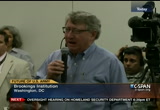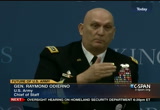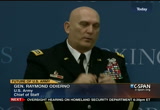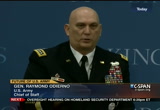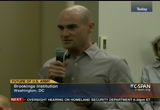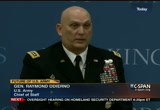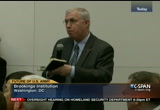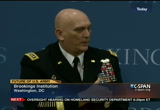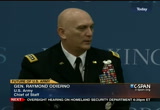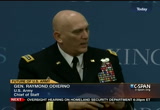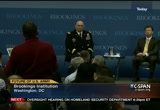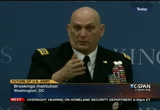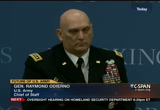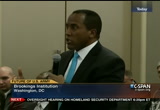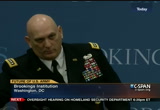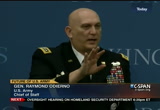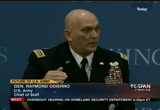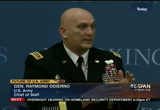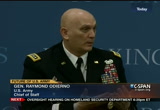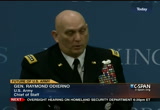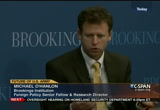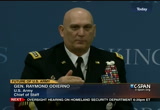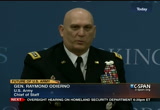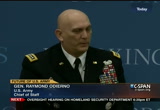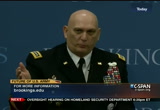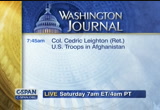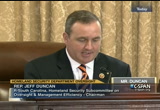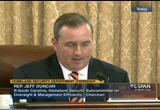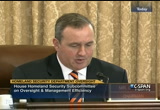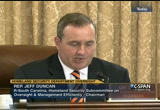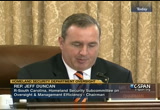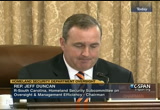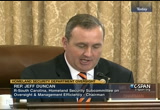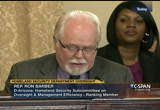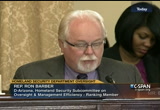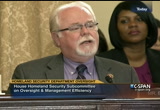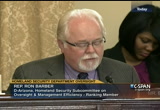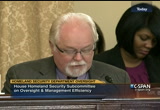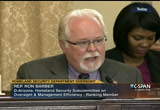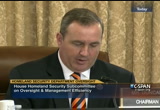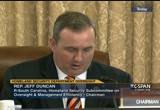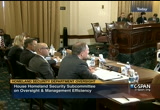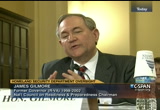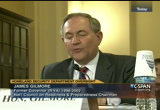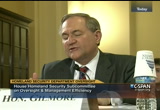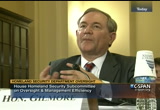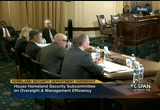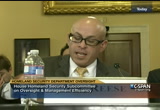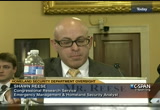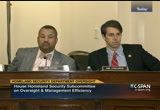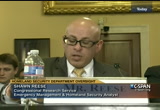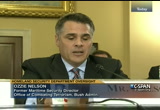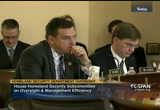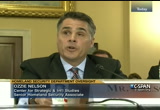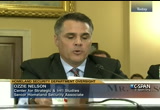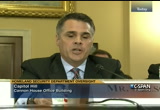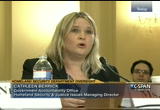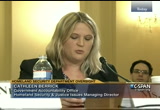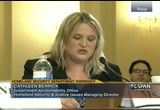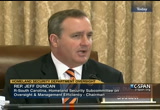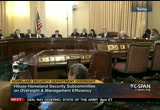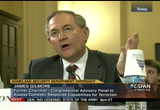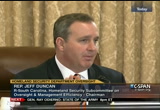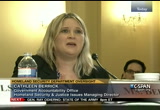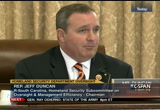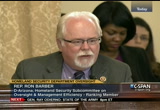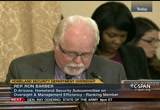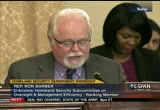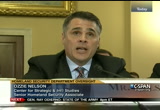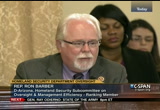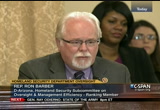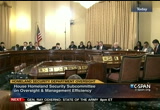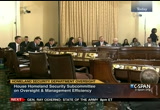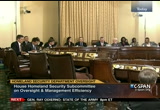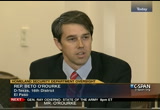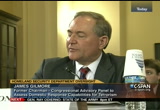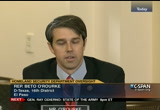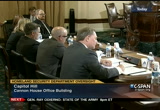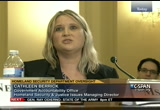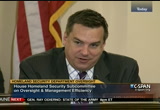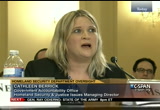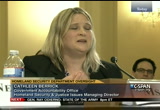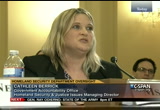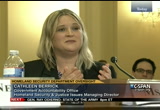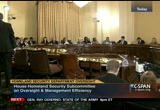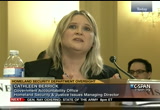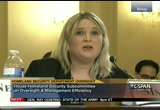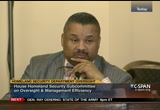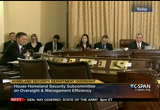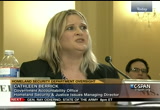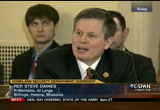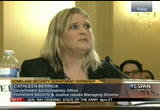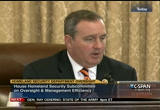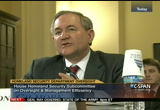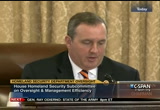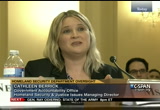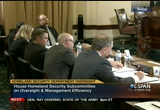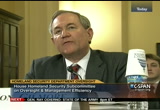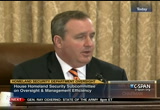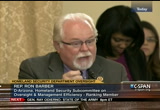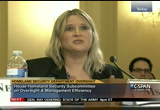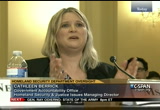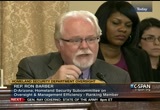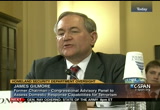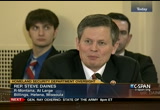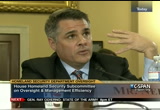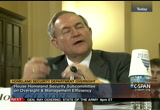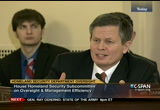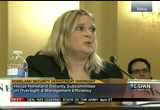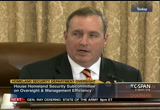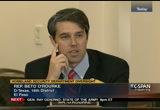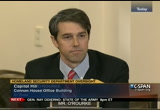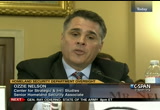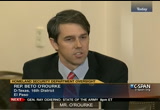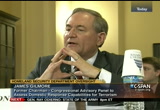tv Politics Public Policy Today CSPAN February 15, 2013 2:00pm-8:00pm EST
2:00 pm
right to certain veneration and it will be located in the presidential library. even if they are gone, their children and their former allies, their attendance -- their lieutenants, they continue. they are even more ferociously committed to the legacy. the problem is what does the government do, because it is responsible for this reply -- for these libraries. >> see details challenges as a former director of the nixon library. >> the house of home and security oversight -- witnesses include james
2:01 pm
gilmore and officials with the government accountability office. the report highlights government programs and agencies that may be vulnerable to fraud, waste and abuse, and mismanagement. this is just over 90 minutes. >> the committee on homeland security, somebody on oversight and management and efficiency, will come to order. the purpose of this hearing is to examine the efficiency of this department of home and security and how widely the are spending taxpayer dollars. let me begin by extending a warm welcome to the other members of the subcommittee. i am looking forward to working with the ranking members as we both share a commitment to u.s. border security and ensuring our board agents -- ensuring our
2:02 pm
border agents receive the support they need to protect homeland. also look forward to a strong bipartisan cooperation in helping to make the department of home as security as efficient and effective as possible. i would also like to introduce our new freshmen majority members. we have mr. richard hudson of north carolina. later joining us will be stephen from montana. they bring a welcome experience to their new roles in congress and the subcommittee. i look for to leveraging their experience and knowledge to provide effective oversight of hds. -- of dhs. i think the subcommittee staffer diligently working together to put this hearing together.
2:03 pm
thank you for that. i now recognize myself for an opening statement. next month marks 10 years since the creation of the dhs with the homeless security act of 2001. the attacks on september 11 forced to rethink our approach to defining the homeland. as the commission report documents, before 9/11 no executive department had the job of defending america from domestic attacks. that changed with the creation of the department of home and security. dhs was established to prevent and terrorist attacks within the united states, reduce america's vulnerability to terrorism, and helped america recover from any attack that may occur. dhs has faced a massive challenge of creating a new organization by integrating 22 separate federal agencies and components into a unified department.
2:04 pm
it is important to always remember the gravity of the issues dhs faced in its conception and how those experiences affected the department's current responsibility to protect attacked critical infrastructure -- to protect critical infrastructure. today we seek to assess how widely dhs is spending america taxpayer dollars. hasn't been successful in meeting its mandate established by the, security act of 2002? we know there have been attempted terrorist attacks on the u.s. that have been thwarted sense of 9/11. incidents such as the 2009 attack on fort hood that killed 13 americans, or the 2009 underwear bomber and the 2010 attempted car bombing in times square reminds us to remain ever fill cholent.
2:05 pm
-- ever vigilant. good member of dhs' success or the criteria people should use to evaluate the dhs. americans question how we use the resources entrusted to us. now it has a budget of almost $60 billion and employs 22005000 people. -- two hundred 25,000 people. the government accountability office exposes billions of dollars and cost overruns that major dhs acquisition programs have incurred. as we have learned yesterday, dhs remains on the high risk list in several areas, including department management. the inspector general has identified over 1 billion in
2:06 pm
questionable cost. vhs -- dhs has yet to but these cost-saving opportunities. in 2012, the inspector general also identify specific challenges on how the department techs the homeland and manages its operations. the report noted difficulties in securing airports, identifying travelers in and out of the united states, and in fema on declaring its federal disasters, despite spending $4.3 billion annually. much more work remains for dhs to efficiently manage its finances, consolidate all legacy databases to efficient data system and improve acquisition outcomes. other examples of acceptable waste by -- of unacceptable waste by the dhs have been revealed. the congressional foundation has found that these tsa has 300,000 staff --
2:07 pm
they did not include t.s. a screeners across the country. half its budget and pay will compensation. according to reports, dhs generally dull about $61 million in salary awards in 2011 despite hard economic times and reduced take-home pay for many hard-working americans. since its inception, they spent $35 billion in common security grants. a recent report documents how dhs prioritizes its grant funding with the just employees -- with dhs employees. other examples exist of them spending money on overprized law enforcement training materials and even bagpipes for the custom order a protector.
2:08 pm
while it has taken steps to improve its day-to-day management, i believe the american people deserve better. we are over 60 trillion dollars in debt. our working families have had to make difficult budget decisions, dhs passed to the same. performance problems can have continued in this constrained budget environment. we must help ensure dhs become a better stewart of tax dollars. recommendations by today's witnesses will help us better understand the issues that dhs faces and identify ways to help dhs improve. i look forward to their testimony. the chairman bomb that recognize the ranking member of the subcommittee, for any statement he may have. >> thank you mr. chairman.
2:09 pm
it is a pleasure to be here. i welcome witnesses and members of the subcommittee. i am looking for to working with the chairman and a bipartisan and productive manner as we conduct oversight in the department of homeland's security and other security functions. it is apparent, having met with the chairman at length, that we see eye to eye on many issues related to the efficiency and effectiveness of the department. i appreciate his collaboration as we move this important agenda for tweets this is our first subcommittee meeting at cannot think of a better issue to examine. the department of, security has one of the largest budget in the federal government. each year brings in $40 million in appropriated funds that flow in and out of the department.
2:10 pm
these funds are used to pay over two hundred 20,000 employees, secure our aviation system, provide disaster aid to local governments, and purchase the equipment used by those protecting our borders. we owe it to the taxpayers to ensure that these funds are appropriately used, fully accounted for, and spent wisely. unfortunately, over its 10 year history, that has not always been the case at the department of common security. my congressional district in southern arizona includes over 80 miles of u.s.-mexico border. we are particularly affected by criminal activity along the border, with nearly 40% of all drug seizures and apprehension occurring in the tucson sector. the department must do better. i am reminded, as i think about safety along the border, of two deaths that have occurred in the last 3.5 years.
2:11 pm
the chairman and mentioned that we attended a dedication ceremony of brian terry, a border patrol agent who was killed in the line of duty. i am also reminded of the death of a fourth generation rancher who was killed on his own land by a cartel member. the safety of the men and women who protect our border is paramount. the department must respond and use the money wisely to do so. as a representative -- as their representative and one of only 10 members in congress who shares a border with mexico, i am committed to border security. i have seen firsthand how the department uses taxpayer dollars to secure the border and i know we can do better. we can do more. in 20 06, the department of
2:12 pm
homeland security announced a plan that would serve as a virtual fence and provide border patrol with information it needs to secure the border. unbelievably, the contract that allowed the project go forward dissolved. that isr it rward -- unacceptable. we are still without a plan that was originally envisioned. arizona border's technology development remains in question. according to the jo, the department does not have the information necessary to support the estimated $1.5 billion plan, which is the successor to the council's multibillion-dollar fbi net. the department has not demonstrated the effectiveness
2:13 pm
in deploying surveillance technology. the jo also found that $1.5 billion cost estimate may not be reliable. if this new plan goes awry, the department will have spent over two billion dollars in an attempt to develop technology with little more to show them cancel programs and canceled checks the contractors. this is but one example why the department must go through this acquisition system, to improve how it does its job analysis and make sure we have a better way of purchasing technology. the new administration has made some improvement, the newly created accountability and risk- management designed to manage the oversight acquisition program appears to be a step in the right direction. i am concerned only 45 staff in this office are responsible for over $18 billion.
2:14 pm
making use of scarce taxpayer dollars and doing all it can to protect men and women who live along the border and across our country is the first responsibility of this department and a primary responsibility for this committee. i look forward to that hearing and testimony. thank you mr. chairman. >> thank you ranking member. other members of the subcommittee are reminded that opening statements may be submitted for the record. we are pleased to have a very distinguished panel of witnesses before us today on this topic. the honorable jim gilmore is a chairman of the congressional advisory panel to assess domestic capabilities involving terrorism and weapons of mass destruction. as governor from 1998 to 2002, gov. gilmore was virginia's attorney general. he also served as a counterintelligence agents to
2:15 pm
get thank you for your service. in 2009, he became president and ceo of the free congress foundation. he is an expert of, security policy. he has written numerous reports to congress on federal, state, and local online security issues. he has testified before the house government and oversight committee on the home and security advisory system, the house homeland's security committee on counterterrorism training programs. prior coming -- prior to coming here, he was in the united states army for 10 years. mr nelson works at the center for strategic and international studies. mr. nelson joins us after retiring from the united states navy. thank you for your service. in 2005 he was elected to serve as an inaugural member in a
2:16 pm
national counter-terrorism center director of strategic planning. prior to his assignment, mr. nelson served as an associate director for the office of combating terrorism on the national security council. cathleen berrick is the managing director of, security and justice issues at the accountability office. she oversees the gao reviews of home and security. prior to being a big prior to being named managing director, she oversaw the reviews of aviation and service transportation security matters, as well as the department of common security management issues. prior to joining the government accountability office, she held a position at the department of defense and u.s. postal service. thank you all for being here today. the chairman will start by recognizing governor gilmore.
2:17 pm
>> thank you very much. mr. chairman, mr. ranking member, members of the committee, thank you for taking into consideration this important issue. the free congress foundation -- we started as a center of national security to address many of the big strategic issues. not the least of which is home and security issues. i carried the national advisory panel on home and security for three years before the 9-eleven attack. what was the governor of virginia i was doing that work. tenures on we are in a position to do an assessment of colleagues. i would like to address very quickly some of the strategic issues for just above it. the fundamental question for the committee, subcommittee, and full committee is do we have a strategic plan that is adequate
2:18 pm
to safeguard the nation? and is, a security structure to really carry out that? how can you really assess the effectiveness of the department of, security unless you examine their mission, and their strategic plan and whether or not they are successful with that. you can focus on customs and border immigration, tsa, coast guard, the office of preparedmness. but we at the advisory panel did not initially recommend the office. it does not include the department of defense, cia, fbi, and most importantly local and state officials. the question before the committee is has the strategic plan included enough to be able to secure the border beyond the homeland? i point to two issues. al qaeda has said that their goal is to collapse the economy of the united states. i think the committee have to remember that within the context that if we waste money or carry
2:19 pm
out an end -- carry out an ineffective program that trust to much money, we actually carry out the mission of al qaeda. secondly i want to point to the issue of draft -- issue of drug trafficking. this is a serious danger to the united states and remains so. the cartel are extremely vicious, they threaten members of the constituency not only in the southern border but across the united states. the young people who are becoming addicted -- this is not a voluntary matter. this is involuntary. young people's lives are being destroyed. the border issues and issues of cooperation with our allies and our law enforcement people is most critical. let me focus in the last two minutes on the real concern that i have. that is the issue of the civil liberties and civil freedom of the united states.
2:20 pm
the real danger is there will be another attack. there is almost likely that it will be another attack. it is and has of our adversaries. if such an attack resulted in either panic, hysteria, or insecurity in the minds of the people of the united states, there is danger of overreaction. not only in the public but specifically out of the congress of the united states. i pointed out that the patriot act was passed in 26 days after 9/11. there was a political need by the members of the congress to get reelected and get those votes and show real activity. this can happen again. i am not condemning the patriot act but i am saying i am concerned about the mindset that could occur if there is another attack and we are not appropriately prepared. i would suggest to the members of the committee that a goal we
2:21 pm
should see in homeland's security is more public discussion with the people of the united states about the nature of the true threat, whether or not there is a real danger, what the potential prepared this is -- prepared this is, how people should participate, whether or not we are ready to respond to an attack, and its leadership opportunity is significant. it is big for the department of online security. but the department is quite in terms of its actual discussion with the american people. a confident and, as will be necessary in a time of crisis, to make sure that we do not restrict the liberties of the american people in exchange for security. the goal of the united states has to be to have a plan in place that not only secures this nation but also simultaneously and without any mitigation secures the civil liberties of
2:22 pm
the american people at the same time. thank you mr. chairman. >> thank you, governor, for that by testimony. the chair will now recognize mr. reese. >> on behalf of the congressional research service i would like to thank you for the opportunity to appear before the subcommittee to discuss common security. crs was asked specifically to discuss the definitions and how multiple definitions within strategic documents affect the funding and risk-based prioritization. many observers agree that privatization of national, security is needed and a consistent definition is necessary to prioritize missions from border security to counter terrorism. my written statement addresses these issues in details and discusses the absence of both
2:23 pm
standard homeland's security definitions and a single national home and security strategist. along with potential issues related to these matters i will now briefly discussed these issues. presently, home and security is not funded using clearly defined national risk-based priorities. , arguably, these priorities need to be sent and clear in order to be most effective. in august 2007 congress enacted the 9/11 commission recommendation act. this review was to be a comprehensive -- including recommendations and the long term strategy and the nation's prosperity and guidance on the budget, policies, and authorities of the department. critics argued that the
2:24 pm
original 2010 version of the review did not meet these requirements. currently, dhs is developing the to any 14 quadrennial review. -- the 2014 quadrennial review. the concept and definition defects congressional appropriation and dedication priority. more than 10 years after the 9/11 terrorist attacks, policymakers continue to grapple over the definition and concept of common security. today there are numerous missions strategies, such as national strategy for global supply chain and security and the national response from mark. today there is no single comprehensive national homeland security strategy. the concept is evolving. one may even argue that it might be waning on a separate comprehensive policy concept. evidence of this viewpoint can be found in the current
2:25 pm
administration incorporation of common security staff into the national security staff. the inclusion of home and security guidance in 2010 national security strategy. it has not been a distinct strategy since 2007. additionally, the office of management budget has questioned the value of requiring federal departments and agencies to of by homeland's security findings in therefore -- in their 2014 budget request. three options stand up to address these issues. congress could require based 8 national home a security strategy, which would be similar to the bush administration's 2007 and 2000 to strategies. congress could require a refinement of the national security strategy. finally, congress made strictly
2:26 pm
focus on dhs activities. this would entail dhs for the refining its quadrennial review, which is presently doing. in closing, competing definitions and missions may hamper congressional authorization, appropriation, oversight -- it also may restrict dhs' ability to prioritize and execute initiatives. failure to prioritize and mission mayurity's result in unintended consequences. i will conclude my testimony here. thank you for the privilege to appear before you. >> thank you so much. we now recognize mr. nelson. >> good morning. thank you for the opportunity to testify today. i want to note that i am now vice president of technologies.
2:27 pm
i want to discuss the american people -- following 9/11 created the department of common security and give it a mandate to protect all people from all things all the time. with this and it came relatively -- federal budget. dhs will continue to protect a homeland in a period of limited budget. we must face the but the fact that it cannot guarantee and cannot afford to provide absolute security. instead we must gracefully approach to protect the nation's security. this would require a define where the risks are. vhs is moving in this direction. in the past we have not had the political will.
2:28 pm
the silver line and the current fiscal client presents an opportunity to fully embrace the risk-based approach. my written testimony includes a broader range of ideas and test and analysis. d first. hs will need to continue its focus on information intelligence sharing. it enables policymakers and the cnossus to make informed decisions on where the risk is highest. it becomes all the more valuable as the department of transport -- as the department transition -- the current architecture may not be fully optimize, it will continue to play a valuable role of information sharing that must not be abandoned. as such, dhs must take steps to ensure the controversy over how
2:29 pm
these people are employed does not continue to get utility did the department must accept the state and local entities will only continue to participate if they add value beyond commentators and worked to strike a balance between counter-terrorism and allied recognition. i want to discuss screening credentials. dhs screens financials of millions of people every day to gain asses from everything from travel to computer systems. we have allowed dhs to allocate resources against those that did it to those that pose the greatest threat. this diffuse model is inefficient and demands rises. it may lie with an enterprise approach. integration of all databases should get some rigid and programs like t.s. a's screen
2:30 pm
check should continue to be expanded including a greater number of travelers from a variety of sources. for the trusting travelers and providing an id number of by magic of a house that would be recognized across programs greater increase upper ability. the it just cannot only increase security -- this goal should be embraced and supported by congress. but in conclusion, moving to a risk-based security will not be without its challenges. it will require the american people to engage in an ongoing dialogue about our priorities. it is important to emphasize and understand that the matter how well executed and the adoption of risk-based models will inherently mean a saving some degree of risk. we must be willing to accept not only the risk of the potential consequences.
2:31 pm
we must work to provide complete protection when there is an attack. for the more it means accepting that while some missionaries will see increased resources, other apps may receive nothing. if we are able to accept these facts, a risk model holds the potential to tomorrows track -- to tomorrows threats. thank you for the opportunity. >>, so much. the chair will now recognize miss berrick. >> thank you, i am pleased to be here to this dhs' ongoing efforts to build a unified department. when dhs began operations, gao recognize the creating such a complex department would create years to read it would be years to achieve. -- would take years to achieve.
2:32 pm
our work is collectively shown that the department has made significant progress. it is important to note that dhs is still maturing and there are several cost-cutting things that have affected -- that need to be addressed moving forward. in terms of progress, dhs has developed strategic and operational plans, hired workforces, established new offices and programs and issued policies and regulations. however more work remains. many of the problems of, a significant price tag. for example we reported that they need federal informational and coordination to prevent unnecessary duplication among overlapping large grant programs that accounted for over $20 billion in grants for -- $20 billion in grants awarded since 2011.
2:33 pm
dhs experienced schedule delays with the secure border initiative program. dhs has also taken action to address the small percentage of individuals -- and i reported that they could also reduce the cost the federal government has made to federal disaster -- to better reflect the state's capability to respond to that disaster. had the indicator been updated for inflation alone, about 25% fewer disasters may by the federal government between 2004 and 2011. among the specific reasons, we identified three, things that have hindered the department's progress and should be addressed moving forward. first, dhs has made important strides in managing their acquisition and it in recent
2:34 pm
years. however, significant challenges remain. majorxample, dhs' acquisition programs continue to cost more than expected, take long girded ploy than planned -- longer to deploy than planned, and deliver less capability than promised. 16 of these programs accounted for $32 billion in cost overruns over a three-year. second come dhs has made important strides in coordinating efforts with the stakeholders but needs to take additional action to strengthen partnerships in the sharing and utilization of terrorism and law enforcement information. gao identified information
2:35 pm
sharing as high risk and it has been on our harvest since 2005. limited assessments to former approach has limited the effort. they have made less progress in actually of incorporating that information into its planning and budgeting decision process. significant role in home as security, it is critical that its operations are operating as effectively as possible, are sustainable, and continue to assure security needs. 10 years after dhs' creation, they have made significant progress but have yet to reach their full potential. double for the opportunity to testify for the question. >> thank you so much. i think the witnesses for an
2:36 pm
excellent testimonies. the chair will now recognize himself for questions. 10 years. it tremendous opportunity for us to stop and look back at the effectiveness of the department. oversight to ensure that taxpayer dollars are spent effectively is an important part and role of congress. the protection of civil liberties and is, in my opinion, just as important. with the passage ndaa and fear of indefinite detention among american people, cispa, sopa, and executive orders due concern americans about their civil liberties and privacy. your panel made the issue of civil liberties a cornerstone at
2:37 pm
the commission. are you satisfied the department is evaluating each initiative in terms of how well they preserve our unalienable rights and making sure they are not crossing the line. >> i am not. as i said in my opening remarks, my principal concern remains that without a thorough discussion of the nature of the threat and the preparedness of the united states to respond to it, there is a political environment that could in fact danger and threaten the civil freedoms of the united states if all the sudden the american people demand a response. civil liberties could be the first thing to go overboard. you mention the national defense authorization act. i think it is a very legitimate concern. one of the principal focus of our advisory panel was whether or not and how to use the military to -- the military in
2:38 pm
the homeland. if you create a stress environment in the united states, there is a danger that the executive branch will simply respond and use whatever resources are available to it without regards to restrictions. it was one of the five principal focuses of our advisory panel and our concern over this type of environment. the ndaa does begin to move the military into a domestic responsibility and to a domestic function. this is not good. that is why the focus of our panel is on local and state responders as well as federal law enforcement so that non- military people are doing what is necessary to protect the homeland. as i " -- as i close this
2:39 pm
answer, i am concerned about exactly the issue that pointed out. >> thank you for that. i share that concern. just recently the general assembly in my home state passed legislation to push back against the ndaa. we are watching that very closely. on wednesday the full committee had a hearing looking at the new perspective on the threat of a homeland. david walker spoke of the value of appointing a cheap operating officer for the apartment of home and security. we met yesterday and he elaborated the distance -- elaborated that this position should have a level to consideration. the department of defense has done something similar with its chief management official. ms. berrick, from a management ankle how effective you think this model is in helping dhs
2:40 pm
improved its leadership? >> thank you mr. chairman. i think that can be effective. that is the suggestion gao made early on in the department's creation. having the central authority and continuity over the department. i also think dhs' current structure can be effective, if the individual is given the authority and resources to implement their position affectively. a few months ago, dhs issued a directive the strength since the management authority among the various components. we think that is a very positive step in the right direction. in summary i think both models can work. if the secretary for management is given the authority he needs.
2:41 pm
>> mr reese, just a follow up. you talk about congress directing initiatives through budgeting and other things. do you think congress should have more day-to-day -- more hands on input on how the money should be spent and directing dhs in certain areas? >> we are for congressional research. i do not have an opinion that there is an option that congress could be involved through legislation, piossibly requiring dhs to recognize wrist a security within the department. or congress could look at cost cutting and getting the whole of a government to discuss and prioritize missions. that is one way that would offend -- that would affect funding an appropriation. >> the chair will now recognize
2:42 pm
mr. barber for his question. >> as i think of how we should spend public money, i think we should do it how we do it in our household, with prudence and care. when public money is spent it has to be extremely uncomfortable. -- extremely accountable. we are better than we were when we started at home plate. it is no small task. i acknowledge that the secretary has taken the most important and challenging tasks and federal government is trying to bring together two agencies into an effective organization. i participated in the formation of an agency that brought together state agencies. it is still a work in progress. we cannot afford to let that continue to be an issue.
2:43 pm
i am going to ask a question to mr. nelson. according to the partnership of public service, the department is ranked 19 out of 19 fo the large favorite government agencies in terms of employee satisfaction. i talked about examples of the problems of management and management priorities. for example we have had six sector cheats in six years in the tucson sector. we have had concerns raised by people on the ground, the men and women who protect their country in attention to priorities. beginning with the most basic -- i have been told that employees or agents were unable to purchase uniforms they needed to report for duty. our agents are assigned a ford
2:44 pm
operating basis. along the border they have been charged with 24 our staffing with no overtime. my question is this, what impact you think these policies and dissatisfaction among our agents has on our security and the effectiveness of the department of functions. what do you believe the department can do to improve the leadership of the management and work force? >> thank you for that question. dhs is probably one of the most difficult places to work for a variety of reasons. we have to wake up every morning and protect all people from all things all the time. they have 0 margin for error. additionally, no other department interacts with the american people in such a personal level in a daily basis. that makes their job extraordinarily difficult. we are 10 years into this. we did not have, prior to 9/11,
2:45 pm
we did not have a dhs work force. we had separate agencies operating differently, but we did not have a unified department. the last 10 years has taken its toll. i do believe the department has made significant strides in trying to create, security personnel conjuring, to temper this individual to have clear paths for them, to do the best they can to meet their demand. we are going to have to continue that. we are going have to have a home as 30 work force. -- a homeland's security work force. they have to do this with state and local governments and with the private sector. creating a work force was such a broad mandate and would take some time. it will take some strategic investment. >> thank you for that answer. i remain concerned, as we all should, that employee morale is at a low level.
2:46 pm
i understand the difficulty of bringing together 22 agencies. we must do better, particularly for the men and women who have to put on the uniform to protect our homeland. let me ask you if i could quickly come ms. berrick, about another issue. i recently requested gao of order resource deployment. the gao report came out a month ago. we had public meetings on that in arizona. what was disappointing was the result of that store -- the result of that study showed that when the department rules out a strategic plan, they had no goals or metrics or valuation processes. as the department has now accept gao recommendations by november
2:47 pm
this year, what immediate steps should be taken? and who should be at the table? who should ask about the goals, a risk-management measurements, and valuation process before those changes or aspects of the plan is implemented? >> a couple of things. it is important thatdhs implement strategic plans. the recent polls and measures are important because it really is howdhs is going to secure the border. what are they ultimately in shooting for -- ultimately shooting for? do they have the resources they need to do that and what is the appropriate mix of resources? dhs used to have a measure called operational control that they have stopped using since 2011. that major basically said how well we are doing protecting the
2:48 pm
border, stopping the illegal traffic coming through the border. dhs has stopped using that measure. now they are just looking at apprehension, which isn't as sophisticated a measure. it does not give a great measure of security. they are in the process of revising that. it is going on two years now. coupled with that they need to determine what the appropriate mix of resources is. in terms of who they should bring to the table, they need to bring all the relevant stakeholders. i think they should have agents that are on the ground, that are dealing with this day in and day out. sticklers along the border. other federal agencies play a role in this. as i mentioned in my opening statement, the need for dhs to forge effective partnerships and bring stakeholder ins -- brings
2:49 pm
the colors in on this key decision is critical. -- bring stakeholders in on this key issue is critical. >> we will now recognize the chairman from pennsylvania. >> delaware for the work you have done in preparing your testimony today. looking at the 10 year history of dhs, have any of you given consideration as to whether perhaps some of these agencies should be the era organized themselves? what i am looking at, wondering about, is whether a more efficient structure at the agency could help morale. any of you, just the
2:50 pm
consideration of free organization of the elements within the agency that would promote more efficiency. >> speaking on a half -- speaking on behalf gao's perspective i think it could have been organized in a number of different ways. the decision was made to create and integrate the 22 components. they are 10 years into it. i think it can be successful and organized. there are some cost-cutting issues that they are going to need to address. one of them is within the department. i have had the direct ability there, the direct ability to impact their mission. there are other issues they need to address. perhaps this is more of a question that they were first creating -- they can be successful but they are going to need to address these issues.
2:51 pm
>> is that not true? >> if i could respond to you very quickly, you are concerned about morale because of the identity of the department. the department can together as a whole group of already existing agencies -- they all had their own identities and now they are being asked to take on new identities. we are 10 years into this. we at the advisory panel focused our issue on the mission and think that the committee should do that. the question is is the mission being performed successfully? if it is not, is that because we have these district organizations and can they be reorganized in a better way? the work challenge i see is dispensed much time and money
2:52 pm
trying to integrate manager really that may be the mission could be lost. >> thank you. >> the chair now recognizes the gentleman from texas for questions. >> thank you. gov gilmore, you mentioned one of the ames al qaeda has is to destroy our economy. i represent much of al's of texas. -- much of el paso, texas. right now we have wait times for cargo that lasts up to nine hours. it is becoming more cost effective for some of the shippers to air freight cargo out of that location rather than cross it through points of
2:53 pm
entry. with the potential for sequester and the possibility we may need to defer or even cut positions when we are already understaffed at this point of entry, can you or any other panelist address what that might do to our economy and how we might better prioritize those crossings? i remind everyone that more than 6 million jobs on this country are dependent on that. >> it is a remarkable question about how one economizes -- economizes economic power of the united states with the challenge -- the economic challenges we are seeing our strategically the goal of adversaries that want to undo it. the mission of what you are discussing is a good one to lay on the table.
2:54 pm
how can we continue to have congress while at the same time we deal with this problem of the ingestion of illegal drugs, by illegal individuals, and a legal human arms and trafficking. -- and illegal arms and human trafficking. i think it is a legitimate question. have we become so focused on managerial questions, how do we deal with morale and integration of all these district organizations, that we are not able to achieve the mission which is to secure our economic strength? i think it is a legitimate inquiry. >> one of the issues that you touched on in your testimony, so much of the focus our legitimate crossings and the length of border in between those
2:55 pm
crossings is on injured taking drugs -- on interdicting trucks. -- on interdicting drugs. states have approved a medicinal use of america, which of marijuana. two states have legalized. it is clear the direction this country is going. one recent report i read shows that 95% of the border patrol's resources as they are committed to this war on drugs, do you have any information on how congress can better prioritize our resources to focus on those threats that we can all agree are a lot more existential in nature. those things that are true evils that we want to stop and prevent
2:56 pm
from entering this country. >> thank you. i do want to make a comment related to how to go about doing that. the recent management is so critical is because it enables them to implement their mission. to facilitate commerce up -- while balancing that -- i will give you an example. dhs was developing a program to detect shield the nuclear -- in- line they needed to fill this problem quickly, balancing congress with security. the problem was they were not getting stakeholders in vault on what the requirements work. they weren't managing it with the reader they needed to. they ended up with a program that didn't even fit with primary inspection lanes.
2:57 pm
that was a management issue that had a direct effect on dhs' ability to secure our borders. it is critical and i think making those tough decisions is central to that. >> i know that time is almost expired, but if i may give a direct answer. there will be no aid and comfort from me with respect to the legalization of any kind of drug in the united states. as a former prosecutor and attorney-general, what is overlooked is the involuntary nature of the use of drugs. we think it is a libertarian kind of idea -- the truth is people aren't doing what they should do or what to do. they are doing what they are being compelled to do, particularly with narcotics. we have to have a more honest conversation with the american people about it. >> time is expired.
2:58 pm
the chair recognizes the gentleman from north carolina, mr. hudson, four questions. >> thank you to the witnesses for being here today. i appreciate your comments about legalization of drugs. my question today is directed toward miss berrick. the accountability office does an excellent job reporting on initiatives which have to put the goals and activities -- which have duplicates goals and activities. gao added five as the key areas of overlap and fragmentation in the department of, security activities? >> we issued a report annually on representation across the federal government. our first two reports have been issued and the third will be in april this year.
2:59 pm
but we have identified 17 areas of duplication overlaps and presentation that we believe the department should address. some of it will require congressional action. i mentioned in my opening statement the coronation of grant programs, there are multiple grant programs that dhs administers that overlap -- they are going to overlapping individuals for overlapping purposes. that may be o.k. but department needs to have visibility on where those grants are going. that was by design but not by accident. we believe that the coronation and visibility over the projects for these grants -- there are also opportunities to streamline grant services. it will make it easier for the department to manage. another example is related to federal debt -- to federal disaster defense. when the president makes
3:00 pm
decisions about declaring a federal disaster, the federal governor requests that fema assesses the state capability to respond. they base that assessment on basically a per capita right now the indicator is $1.35. that figure was created in 1986 and it has not been adjusted for inflation every year since. had that indicator been adjusted, income within this state, 44% of disasters declared over roughly over the last nine year periods would not have been funded by the federal government. had that factor been adjusted for inflation lone that figure comes down to 25%. i think in a tough fiscal environment with reduced budgets that the department is going to face, as the entire federal
3:01 pm
government is facing, they need to look for opportunity, to streamline operation and be more cost effect. and be more rigorous when they make resource decisions. >> i think that is true across the spectrum. what do you see in homeland security that they have already taken and been successful and doing some of the streamlining? >> d.h.s. did go through an internal effort to look for cost saving but it focused on operational issues, in the way in which we're managing resources more internally through the department. we think they need to look more broadly. d.h.s. did submit to the congress a proposal to streamline their grant programs and i know that is being discussed and considered. our view is, they need to look at the higher ticket dollar
3:02 pm
items, like their grants, federal disaster declaration programs, other opportunities, for example, at t.s.a. funds, the insulation of systems at airports. they pick up 90s or of the tab and airports pick up 10%. we identify that t.s.a. made a recommendation and they should go back and relook at the cost share. is that appropriate since airports are getting benefits from these systems. we think those are the types of things that d.h.s. should put more emphasis on. d.h.s. was tracking the government's efforts of the implementations and we'll continue to track and report on their progress and addressing those issues. >> thank you. we appreciate the good work you
3:03 pm
do. i yield back. >> chair will recognize mr. payne from new jersey. >> thank you, mr. chairman. i want to thank all the witnesses for being here today. is there a way we can coordinate our technology and communications at our ports so we can ensure all of our cargo is checked? this process needs to be made more effort and to ensure security. >> d.h.s. has a mandate to screen all cargo containers coming into the united states before they arrive in the united states. but they have had difficulty in addressing that. that is a massive problem. they created a program called secure border -- secure freight initiative, i believe is the name of it. they deploy personnel overseas to ensure the screening of containers coming in but they have to get agreements with the
3:04 pm
host country. there's a big price tag associated with it. they are in the early stages. what they have said -- given the challenges in doing this, d.h.s. has to implement an approach, what is the highest risk containers and underutilize the programs they have in place now to target their resources so they can provide the best benefit. they can't secure everything and they have to make some tradeoffs in what they can do. >> it is a very important issue for my district having two ports in my district. let me ask you also, it is my understanding that using private contractors can be more costly even though federalized employees, most of the time do the same job but are paid less. would you agree this leads to
3:05 pm
reduced moral and would you agree that we should move towards federalizing these employees versus private contractors? >> g.a.o. looked at this issue throughout the department of homeland security. a years ago they could not identify how many contractors hay had. what we think is important for them to do now is what is the appropriate mix of federal versus contractor personnel. they have done a lot of work to identify what contractors they have. so i think that's step number one. then they, obviously, with that they should consider the cost, what can be done more efficiently, with contractors versus federal employees. but they need to know how many
3:06 pm
they have and think about what should be kept within house. >> i would think that bringing them in house it would be able to control those costs more effectively than -- as you say, not even knowing how many contractors are involved. but thank you very much and i yield back. >> now the chair will recognize the gentleman from montana for questioning. >> thank you, mr. chairman. big sky is right about montana. i noticed some of my peers here represent districts and states that share borders with canada or mexico. in the light of that, perhaps i'm appreciablive of the candid this morning. have you looked at ways, maybe
3:07 pm
we can spend less money and get more. it is a topic that we see here in washington that will be front and center linked to border security. what can you share with us that we can get better value from the way we administer border security? >> i think the first thing we can do is use the good risk information they have generated and build that into their decision making. recognize they cannot secure everything 100% of the time. what is the riskiest things, if you will, they should be devoting their resources to. i think that is important. a second thing that is important, when they decide to implement a program to secure a border or airports, rarely putting the rigor and discipline in thinking threw what is the right alternative. once we make a decision, how do we go about precuring this?
3:08 pm
we found out that d.h.s. hasn't done a great job, looking at the alternative, weighing the pros and cons and putting the discipline into the process they need to. of course, rerecognize that d.h.s. has to work quickly to respond to threats as they evolve. looking at the department overall, we think there have been a number of missed opportunities because they haven't thought through and done that planning upfront that will would have benefitted them. as a result, programs they want to field sometimes are not successful or take years longer to get them out than they have hoped. >> a follow-up question. when i look at the state of montana, my district is my state. montanas is a state that in one
3:09 pm
corner you can place washington, d.c. and the other corner you can place chicago and that is the size of the state montana. we share a border with canada that is over 600 miles long. let's turn our attention to the northern border. are we putting enough em pa sis on the northern border. we put at love of attention on the southern border but perhaps some comments on our northern border and vulnerabilities. >> i think there are is more work required to the northern border. we used to have a measure called operation control of the board and they did that the if the southwest border and the northern border. the southwest border in delevpb they said they had control of the border, on the northern border it is lower, it is let's
3:10 pm
than 10 -- less than 10%. one thing d.h.s. can do is create task forces, try to employ risk-based decision making. this is going to be part of their strategic plan. they had a plan to identify how they are going to secure the southwest and northern border but they haven't made a lot of progress and moving forward with that plan and putting some meat around -- what is that going to mean in terms of programs and resources? northern border will be a critical aspect that they have to think through as they move forward with that plan. >> if i could add something. the northern border is vast compared to the southwest border. the canadians are the most loyal allies and our biggest
3:11 pm
commercial partners but sometimes they feel like the united states neglects them in terms of our represented operations. i would answer your question directly by saying, we need to think about intelligence sharing and make sure that f.b.i., c.i.a., canada rain officials are sharing information to recognize the risk and the danger. otherwise, you end up patrolling thousands of miles of ununtracked area that is impossible to do. many of the towns are divided by the border. >> thank you, governor. >> may i answer that? i think it is important to know, the last two years there has been significant progress between d.h.a. and canada beyond the plan. they issued an update recently.
3:12 pm
there are a number of pilot programs and awareness inside the great lakes. i think it is one of the strengths that the department has done in the international cooperation and the goal is to have free trade. so canada is now made a commitment they are going to fund some of these programs and they are waiting for the u.s. to reciprocate on this end. thank you. >> i'm looking forward to engaging con trained resources. it would be the citizens and law enforcement as well in patrolling the vast miles of the northern border. >> time has expired but we do have time for a second round of questioning, if the members would like to do that and if the witnesses could endure. i would like to thank the governor for mentioning cooperation intelligence sharing
3:13 pm
with our neighbors. i passed a bill dealing with the iranian and the western hemisphere. a big part of that is how we're looking to work with our neighbors in the western hemisphere and that includes canada. i think that's a valuable thing. my question is, coming from the private sector, what i see out of government a lot of times they don't operate efficiently, like we have to in the private sector. either operate efficiently or you go out of business, or someone steps in that can do it better. the private sector constantly finds efficiently to finds the most effective processes how can d.h.s. incooperate a business model? >> mr. chairman, it always comes
3:14 pm
down as i think, there's a consistent theme with all the witnesses today, with the strategy, planning, and the strategic mission. you have to assess that and find the best possible way to address that. the government is never going to be as efficient as private contractors. back when we did our commission, before we initiated the notion of secure -- of trusted shippers. if you look oversees who is bringing things in and you could have confidence those are going to be safe and secure. then you will focus on the more suspect containers, that, of course, means your government employees are in a position to concentrate their attention as they so loyally do on that type of mission. the key is, that you have to understand what your mission is and whether or not you can most
3:15 pm
efficiently employ your resources to do it. i know you're doing that this morning. >> the word or term operational control is used a lot since i've been in congress. no one has been able to define the what operational control truly is. so i ask the panel, all four of you, what is operational control of our border in your opion? >> when they used that measure a couple of years ago it was apprehension, flow coming across the border, it was pretty sophisticated. currently, they are looking at apprehension which is not a great measure, it is an indicator but it is not a great measure in assessing control of the border.
3:16 pm
my response is that i don't think c.d.m. has a great definition of what is operational control today. they say it may take until 2014 to come up with. we think it is capitol hill -- critical. once theys do define it they don't have a good measure for operational control. >> mr. nelson? >> i would measure it along the terms of how effective are we being in achieving the mission? the effectiveness of the border, how you measure that in apprehension or however you use, it will never fully capture that. you need to capture our effective you are when you're dealing with immigration reformal. how do you measure effectiveness when you don't know the
3:17 pm
strategic guidance from congress or the president on these particular issues. we're still waiting to and that is important going forward. >> i think the discussion -- i've heard border security is not an issue that i focus on at c.r.s. i think that is a good analogy when i was discussing what is homeland security. the very agency is having a hard time like defining it. ping it comes back to this idea, we don't have this concept yet, or we have a concept but it is depending on who you speak to. until we actually have a discussion like we're having now, we wonder what words mean. i don't have an answer for you, congressman. >> what it does mean -- it is
3:18 pm
government talking to itself about what it is trying to achieve. operational control -- i don't know we have operational control or not. it is an accident of the american sovereignty. at the end of the day, if we think we're not bringing cocaine across the southern border, we're kidding ourselves. we know we are. those routes and those methodologies can be used by potential terrorists if they want to do a military operation against us. that is why it is so important. i want to come back to this last theme. if we're going to have operational control of our borders it is because the people in the united states are engaged in this issue. when they participate in drug activity or other kind of activities they are enabling a lack lack of operational control over our borders.
3:19 pm
homeland security is the job of every citizen of the united states not just the government. >> thank you for that. before i turn this over i want to talk about the discussion we had earlier this week. ranchers are fearful to leave their children at home to go into the town to buy a gallon of milk because of the folks coming across the border. it needs to be safety and secure of the ranchers in arizona, new mexico, california, and texas to leave their children home alone on their property and feel safe. >> the point you just made is a point i would like to explore further. my first questions is, we talked earlier about the new strategic plan that was rolled out last may. unfortunately, without goals or measurements, evaluations processes which is problematic
3:20 pm
to say the least. when i think of border security and how you define it, i think it as the chairman just mentioned, when i hear from the ranchers and i hear from them all the time on conference calls and other ways. they are unsafe in their home. to me, that is an incase, at least where they live we don't have a secure border or a border that keeps them safe. but i'm interestinged in adding information that lets us have elements of evaluation. as we think of this new strategic plan, i agree all of them should be at the tail. what suggestions do you have of ways in which the department can measure success using its new strategic plan which is the risk
3:21 pm
based plan? >> you mentioned data and that is one point to make up front. right now the sectors are collecting data in different ways so it difficult for someone to look across the sectors and draw conclusions about security along the southwest border because data is collected in different ways. think -- i think that is important. secondly, part of their strategic plan that still has to be implemented is how they are going to leverage stakeholder relationships and how those will be developed and supported along the southwest border. they need to define what that needs to look like and how they are going to implement it. that is critical as well. i think the third piece is what you mentioned, they have to make decisions and this is a policy call as well for the country, what is security along the
3:22 pm
border? first of all, define it. to date, border patrol has been operating under the assumption whatever resources they have. they are putting them along the border and they are thinking this is the budget i have, this is what i can do versus what is the end state? do that in a risk-based way and once they define that they need to have measures and collect data in consistent ways so they can look at ways to achieve that. it has to the been defined they are going don't have measures and the data is inconsistently collected. >> i have heard that from many people. let me ask a question, governor, of you. as we discuss and as you know there are been numerous occasions where the government has wasted millions of dollars
3:23 pm
that does not achieve the security goal. i know that you have to spend your money wisely, you have to put it where it is going to make the most profit, if you're in business. i think the government needs to find ways to do the same. i've heard from a number of small business owners that they have great ideas. but the problem that they face is how to penetrate the burekcy of the d.h.s. -- bureaucracycy -- bureaucracy of the d.h.s. what is your thinking on how we can change that situation or that die am nick that these good ideas can at least get a hearing? >> i've never been able to do it. congressman, it comes down to administrative and congressional
3:24 pm
demand that it be carried out. there needs to be a focus on oversight on the best way to do that and if homeland security is implementing it. so if they go back to the usual suspects of the community, the question the, are there better ideas that can, in fact, be incooperated and can we find a new methodology to do that? the typical approach of the government, particularly of d.h.s., is to hire a big player. for smaller businesses it is to be subcontracters along there. the question is, can we find a way that we're fully engaging the small business people as they come up with new and innovative ideas. i think that is the right approach. >> the chair recognizes mr.
3:25 pm
danes for questioning. >> i hear spending tax dollar wisely. like the chairman, they are asking questions about value and like the chairman i spent 28 years in the private sector where every dollar is scrutinized for a return on investment. i want to move over to cyber security. think is another hot topic. how do we ensure that we get the most bang for the buck. i think there's going to be more investment made there. i've only been here for 4-plus days but i can see this town knows how to spend money and i want to make sure we get a good return on investment and value. mr. nelson? >> thank you for the question. i think the d.h.s. office has a huge role in this when it comes to sharing information and architecture which the in place for the most part.
3:26 pm
how do we utilize that? one of the things we have to focus on when it comes to cyber, because the private sector owns most of that infrastructure is that the flow of information has to be two ways. it account no be the department gets information from the companies, the companies have to be willing to share that information and that is one of the biggest challenges we're having right now to marketing issues and some companies are afraid to share where they are being attacked. that is something that d.h.s. has a low-cost solution, how do we open up that flow of communication? d.h.s., as an institution should be the lead in cyber security training. someone has to do it. every department has some kind of cyber security training. get one department to mandate to do that, consolidate those resources and let them set the base line on how the government employees should be trained.
3:27 pm
thank you. >> thank you. i yield back. >> if i could add. yesterday, i discovered i left my cell phone charger in richmond and my phone went down. i felt completely disenaged and i had to race ipad to get back online. the enemy understands that they can disrupt our cyber abilities, they can disability our responsibilities. that is true in a terrorist situation. i ask this question, do we have a unified american strategy for cyber security? i'm aware that the security has set up a program they are completely unconnected to the department of homeland security. do we have a unified approach to the united states government to cyber security in the country and protection?
3:28 pm
i think we probably don't. which means there is a danger of duplication and confusion. >> one more question, if i could. i spent the last 12 years with a global company and the thing about border security is there are physical lines that we can see and with cyber security it is throughout the globe. any comments about how we can unleash the private sector in it is in their best interest to ensure we have a tight security. any comments from the members? >> it comes down -- 85% of the critical infrastructure is owned by the private sector. how do we enable d.h.s. to work with those entities. should we have cyber experts embedded inside the companies? we have to make those relationships more rebust and that is the key going forward. >> if i could add, we have
3:29 pm
experts that spend a lot of time looking at this issue across government and they would be happy to come up, if you would like, talk about the work d.h.s. has done. it is a massive problem. d.h.s. has key responsibilities. you ask about the private sector. they have set up a team that helps the private sector with their detection cape eakts and the private sector can report accidents through the center -- incidents through the center. again, massive problem that is going to take a lot of work for d.h.s. to address this. again, they will be happy to come up and talk to you in more detail if you would like. >> thank you. >> just inform the members that
3:30 pm
chairman mccall is planning to have a full hearing on cyber security in the near future. i know that the chairman on cyber security is interested in a lot of the questions that you had today. >> mr. nelson, you cited the secretary's goal of getting 50% of travelers enrolled in a secure traveler program like the century program. again to use el paso as an example, we have millions of border crossing every year. the ones traveling north keep our economy alive. they spend upwards $2 billion a year in el paso. you can imagine the thousands of jobs tied to those spending. now the mexican nationals are waiting three to four hours in auto lines and more cruelly in
3:31 pm
pedestrian lines. folks are waiting three and four hours for the privilege of spending their hard-earned dallas in the -- dollars in their economy. one example, the bridge in downtown el pass so of the -- el paso 11 of the lanes, only five are manned. so i really appreciate the goal, however, enrollment and application into the century program costs $122. it may not seem like a lot to some of us but those who are crossing that is not money they have at any one given time. is there any wisdom to cover that cost for the benefit of having those folks screened,
3:32 pm
having scanning, reducing the labor at the point of border crossing, and helping the economy of el paso and the united states? >> thank you for that question. i appreciate that. we talk about the balance between security and trade. we have to providal secure border but we have to facilitate trade not just up north but also in el paso. the price of technology it will go down. enterprise wide we have to have aen approach to screening and we can see cost saving. using something like biometrics it allows d.h.s. to spend time screening those individuals at great risk. most of those crossing the border into the united states want to go back to mexico. we need to expedite thousand
3:33 pm
they are crossing and then go back and they are considered trusted and d.h.s. can go after those trying to smuggle drugs or other activities. if they pursue this, you will so see a cost saving in terms of trade and those kinds of programs. >> and for the governor, i appreciate your comments in regards to how we better pursue the war on drugs, stop illegal and dangerous drugs from coming into this country. but in the spirit of this panel and spending taxpayer dollars wisely, let me try to get at the solution that i hope to arrive at. we're spending billions of dollars right now to stop these drugs, marijuana is the largest, we doubled the size of the
3:34 pm
border patrol. as a father of three young children, i'm deeply concerned that marijuana is more available today, especially in middle schools than it has been before. in the spirit of today's hearing, how do we spend that money more effectively, do a better job in stopping those drugs from coming into our communities and still meet all the other threats that are posed at our border crossings? >> i've been to el paso and i appreciate your representation of that community and your focus on their economic well-being. i appreciate the spirit of your remark here today. i have put a lot of thought into the drug issue. i'm deeply concerned about this. i guess my answer to you is, i see the poisoning of young people whether it is in el paso or chicago is a threat to the
3:35 pm
national security. that's the way i define national security as well as al qaeda and other potential attacks. we can also broadly address the threat of this country as national disasters, we just saw the protesters from new york because of the hurricanes up there. here's the answer, i think, we have to -- the congress should and this committee should put a lot of thinking into the definition of what homeland security is and assess the priorities. make a decision where the limit funds are best spent. i for money believe that the enabling of any drug culture in this country is not in the interest of the united states. i servely acknowledge that you can pick and choose and make those decisions to what is the greatest threat to this country is and use the money accordingly. >> that concludes the first part
3:36 pm
of this sub committee and the hearing of d.h.s. i want to thank the witnesses for their valuable testimony and the members of their questions and participation today. the members of the committee may have additional questions for the witnesses and we'll ask you to respond in questions. without objection this sub committee stands adjourned.
3:37 pm
>> c-span will be live shortly in chicago where president obama is expected to touch on some of the points from his state of the union speech. it will be devoted on things like raising the minimum wage and he might touch on gun policy. the president made plans to meet privately with students in the antiviolence committee. but first a look at the future of the army with army chief of staff with raymond odierno. he was at the brookings institution earlier today. >> first begin with the $18
3:38 pm
billion number that you mentioned. some follow the nitty gritty more than others. let's talk about that number. the $18 billion is in your operation and maintenance account which is paying for everything from the civilian work force to health care, training and maintaining equipment, getting ready for war. you said you're going to protect the funds in that account for those who are already deployed and the who are about to go. can you plain this in -- explain this in the kinds of things these force would be do in the spring and summer that they won't be able to do this year. >> there is a number of factors, the army is responsible for funding the operations in afghanistan. so we won't allow our mission in afghanistan, our troops, in afghanistan to go unfunded.
3:39 pm
the problem is we see about a $5 billion-$6 billion shortfall and we think it might grow to $8 billion. that is a problem. when they signed the resolution, there is a mismatch of funds. there's not enough funds in the operational accounts then sequestration adds another $5.4 billion. what does that mean? we're funding totally afghanistan. we're going to fund totally korea. so what that means is the rest of the forces that are back in the united states will not be able to train. they will not be able to -- they will do very small level training, they will not do battalion level trainings. they will not be able to go out to a combat training centers which is provides them the final
3:40 pm
readiness certification at the battalion level. we're funding the forces in afghanistan and the ones that go in, this ones that go in this summer and fall. my concern is, the ones that go in after them will be behind. when 2014 starts, how long will it take to get them ready. i have two choices, if i can't make that up quickly, i have to send in forces that are not ready or extend those that are already there. that is a decision i have to make as we get closer. we will try to divert money so we don't have to extend people in afghanistan. that is a big concern of mine. it also impacts other things like insulations. we have to cut 70% of the money we have available to run our insulations. we will be able to pay for water
3:41 pm
, air conditioning, that's about it. we're going -- we won't be able to do maintenance on our facilities. when we get the money, it will cost us more because we would have delayed the maintenance of our buildings, of our training system, of all the other things that are run on the insulations. we try to protect our critical family programs, that are needs, counseling and other things for the soldiers but that will also be impacted. it won't be completely protected. this has a day matic affect on training our forces in the future, it has a dramatic affect on our future. we will lose part of our civilian work force, our depos will be smaller so the backlog
3:42 pm
of the equipment coming back, we are still resetting the equipment that came out of iraq last year. that will delay that. it will delay the equipment coming out of afghanistan. that decreases your readiness level. instead of being ready by 2014, it might be ready by 201. it is because of the uncertainty of the world. we just don't know when we might have to go somewhere. nobody knows. 36 years in the army but i will take the last -- since 1989 or 1990, we have not predicted well hen to use forces. when the wall came down in europe people said this is it we don't need anymore. a year later we're deploying to the deserts of kuwait, we went
3:43 pm
into somalia then somewhere in there we had panama. you just don't know. it is our responsibility to be prepared if the president needs the use of military that will we're ready and prepared. i'm concerned that we will be able to do that as we move into the future over the next couple of years. >> you can watch all the general's remark here at 8:00 eastern here on c-span. president obama is in chicago today and he's expected to talk about some of the points from his state of the union speech. this is some of the students from hyde parking academy. his remark will be devoted to helping hard-working families, like raising the minimum wage. he could touch on federal gun coils here as well. president obama in chicago
3:44 pm
3:45 pm
c-span's series on the first ladies. we'll bring you back to hyde parking academy when the president arrives. >> i think the women were interested in politics but had to vehicle to express that in their own lives. so they were attracted to men who were going to become politically active or already politically active. >> each of them i find ingrigging. half of them because they are so obscure. i think half of these women would probably be unrecognizable to most men and women on the street. >> this president's day c-span premieres its new series "first lay dailies" with historians, chiefs of staffs, chefs, exploring the lives of the women that served as first lady.
3:46 pm
in a first of its kind project for television. it begins monday night on c-span, c-span radio and c-span.org. watch the program earlier in the day on c-span. saturday, booktv is in savannah, georgia for the book festival. starting with former vice president al gore on the future. at 1:30 jake tapper on the war on afghanistan from the outpost. at 2:45 evan thomas. at 4:00, gary wills asks "why priests?" that is live on c-span2.
3:47 pm
>> po going to be here at hyde parking academy in just a few minutes. he's expected to speak with students and the staff. the "chicago tribune" reports that his remark might be devoted to helping heart-working families like raising the minimum wage. the president has plans to meet with students privately. he will have his remark as soon as he arrives here in hyde parking academy here in chicago.
3:49 pm
some of the students at hyde parking academy, this is in chicago where president obama is expected to speak shortly. he was expected at 3:45 eastern time. he is running a few minutes behind. we're going to take a look at the senate's blocking of further consideration of the nomination of chuck hagel to be the next secretary of defense. we'll be back here in chicago as soon as the president arrives. >> good morning, thanks for talking with us. >> how unusual is it to have the president's pick blocked at this stage of the game? guest: it is very unusual. the senator has never filibustered the president's nomination for the defense
3:50 pm
secretary. the most bizarre thing, i think, is probably the most frustrating for the people watching this, particularly outside of washington, is that you know, former senator hagel is former republican senator, mind you. the reason why it was defeated because the majority leader harry reid switched his vote to no so he could bring the vote back up again after the senate comes back from recease. a lot of republican senators were saying that they did not want this choice filibustered. even if they wanted to vote no on his nomination he at least deserves an up down vote in order to be approved. the republicans decided to use this vote as a way to extract
3:51 pm
more information from the white house on issues like the attack in benghazi so they passed hagel when they come back. the way you're looking at it, to me, it is efforts to delaying the inevitable. chuck hagel will be confirmed as the secretary of defense. he just has to wait a couple of days. you're going to confirm himny way and it is just another delay in what the senate is trying to to do. host: harry reid set a new vote in 11 days. what do republicans want to see in the meantime? guest: well, they say they would like answers, again, from the white house, more details about
3:52 pm
what the president did and did not do in the terrorist attack in libya. the white house has sent a letter to senators john mccain and others giving them more information. they had hoped by sending this yesterday or the day before, that they could change minds and make the senators vote yes to proceed to the vote even if they wanted to reject hagel's nomination. it wasn't. it seems like they are unhappy with this pick, they wanted the president to make a different pick, and they wanted to be -- host: we did see four republicans cross over and vote with democrats and one voting present and not voting to move forward or not. why did they go that way and who
3:53 pm
were they? guest: senator hatch was one. either you vote yes or you vote no. there was talk that he doesn't believe in the filibuster so he did not want to vote no. i think you should probably vote yes. but republican leadership was actively against this vote so i guess that would be the reason. of the people who voted to not block it one of them was senator collins who is the more moderate republican from the northeast. also the senator from nebraska which is chuck hagel's home state. there was another person who voted to proceed but democrats came one vote short.
3:54 pm
host: so what happens from here in terms of the practicalty of having a defense secretary? guest: i think the white house is irritated and the democrats are irritated. i think you saw that on the floor. you saw senator reid and their decision to do this -- it doesn't look great. it sends a message to the world that our senate is so dysfunctional that it refuses to confirm one of their own. it will be fine. host: thank you so much for your time this morning. guest: yeah, of course. thanks for having me. >> this is hyde parking academy where president obama is expected any moment. he's been making trips around
3:55 pm
the country to talk about his themes from his state of the union speech. he might touch on gun violence and economic policy. as we wait for him to arrive we're going to look at remark from earlier today by army chief of staff raymond odierno. he talks about the future of the army. we want to show you as much of this as we can before the president arrives. >> the question is, as we get to this anniversary and it is still a controversial subjected in the united states and i'm not asking you to necessarily give your big picture view of if the war was worth it. but i am curious on how you think about the lasting pros and cons. you have been through a lot, you have sacrificed a lot, your family has sacrificed a lot. you've seen your soldiers hurt
3:56 pm
or killed and you've seen the great success of the surge. a lot of the progress in the iraqi political system that you helped nurse along and support. how do you in your own mind begin to sort out the good and the bad? >> well, i would say, first, i think a lot about this actually. the one thing that i think a lot of us forget, maybe we don't. but i will tell you what i learned as i spent time in iraq that it is hard to describe to somebody what an awful dictator saddam hussein was unless you were there and got a chance to talk to people in iraq. so i think we forget about that sometimes. i think we get too focused on the weapons of mass destruction -- i'm not going to get into all of that. the people were devastated.
3:57 pm
what i under estimated was the devastation that was occurring in iraq. the fact that education stopped for about 20 years. investment had stopped. people were being brutalized. frankly, none of us know, nobody can say if saddam hussein was still in power, what would that will mean? i don't know. it would not be good. i don't know what it would mean to security in the middle east, i don't know what it would mean for terrorism. i don't know. i know it would not be good depp if nothing else, iraq is not a destabilizing factor in the middle east. they are trying to rebuild themselves. now, is it going the way i would like it to go right now? no. but i think there is still -- you have to wait. we know they are increasing exports, their military is doing ok, there's huge political
3:58 pm
issues, there's long memories. there is still mistrust between political parties in iraq. as long as this huge mistrust between political parties, it is going to take them longer and longer to settle the issues that they need to settle to move forward and to be a country, that i believe, could be a huge stabilizing presence in the middle east. that is my hope that is the way. we're not there yet, obviously. there are still issues that have to be worked out. when people came to see me, i would say here the map, here's iran, turkey, they are in the middle, they are in the center of the middle east. they are an important cub. -- country. we made it more secure and stable than what we did in iraq. i would let them determine if
3:59 pm
the war was worth it, that is their opinion. the men and women who served there are proud of what they did. it was hard. we made some miscalculations, we probably did not have a good idea on what was going on in the beginning. but our soldiers never stopped. by the time we left, there were few incidents that the security was moving forward and the iraqis were able to stabilize the security. that goes to the hard work of the men and women who took on that mission. they are proud of what they accomplished and i'm proud of what they accomplished. i'm proud of what they are doing in afghanistan as well. i get to be there, i leave monday or tuesday. what does n't come through here is there is true progress being made in afghanistan.
4:00 pm
the afghans are taking over more and more reresponsibilities, they are doing it quicker than we thousand. yes, are there political issues absolutely. does that have to be resolved? yes. i think we have made good progress there. that is because of the hard work of the soldiers, sailors, and marines. i'm proud of all >> you can watch the general's remarks in their entirety at 8:00. now, check again at hyde park academy in chicago. president obama expected any moment. in the audience, senator durbin and other members of the illinois delegation. president obama is expected to talk about jobs, the economy, the minimum wage, and gun violence. he had plans to meet privately
4:01 pm
4:02 pm
4:03 pm
ideas for helping working families, like raising the minimum wage and investments in education. he had plans to meet rapidly with students in a youth anti- violence program. we will have the president, live from hyde park academy, as soon as he arrives. first, republican earn of tennessee reacted to some of the state of the union speech. -- first, republican marsha blackburn of tennessee reacted to some of the state of the union speech. thank you for being here. president obama has been on a tour of places like georgia.
4:04 pm
guest: we would have loved to have had the opportunity to talk with him and work with him on some of these issues. the way republicans are getting our message out is through our network of constituents. we are talking to them. you have seen republicans very active on social media this week. you are seeing them very active with town halls. they are talking directly to our constituents, those in our districts. i am going to be heading home. i think everyone of us has a busy week. we visit with our constituents, meet with chambers of commerce, with employers, and find out what is and is not working with them. host: nbc says thomas you are tweaking tone, not principles. how are you tweaking the tone? guest: i think our core
4:05 pm
philosophy and principles -- freedom, free people, free markets, and a small government, making sure we focus on individual freedoms. the communication of that message gets monday a lot of the time. -- has been monday a lot of the time. -- has been muddy a lot of the time. maybe we need some different messengers, some younger messengers. we need to be sensitive to it, if we want people to hear us. it is important we have individuals they are going to listen to. host: the big story in the paper is about the sequestration, automatic spending cuts. "the new york times" says democrats are working on a proposal. but this story comes from "the washington post here come --
4:06 pm
"the washington post." guest: i am for spending cuts. always have been. i have called for three bills calling for spending cuts. i did it in the state senate in tennessee also. we need to cut even more. a lot of my constituents want us not to cut it to percent, but to cut it 10%. -- not to cut it 2%, but to cut it 10%. we want to protect the military. they have already taken a 500 billion dollar reduction voluntarily. what the president chose to do, his addition to the sequester, his addition, was to come in and double down on cuts to the military, which in essence is a
4:07 pm
quadrupling of the cuts to them. what we need to do is cut the nondefense discretionary more, and leave defense alone. but my constituents want to see across-the-board spending cuts. they want to see stabilization in the trust funds for medicare and social security. they want to see a reform and reduction in the entitlements. they continue to push us to do it. the sequestration will go in. what you are going to see republicans do is offer some ideas and some legislation on how we protect the military during this process. host: if you would like to join the conversation with marsha blackburn, republican of tennessee, call these numbers. republicans (202) 737-0002, democrats (202) 737-0002, and independents (202) 628-0205.
4:08 pm
stephen joins us from indiana. hello. stephen, are you with us? let us move on to terrance in maryland, a republican. good morning. caller: good morning. thank you for taking my call. i agree with congresswoman blackburn on the leadership from obama. he is out campaigning all the time, across the country and across the globe. we have real problems here. we really need to solve them. i think the reason republicans have had to do what we have had to do is because we have a lack of leadership. there is no one bringing the republicans and democrats together, as the president should, as the leader of the nation. he is staying silent. he is not at the white house. i am frustrated and upset with it. host: who do you see as
4:09 pm
republican leaders? caller: i think they are representing my ideas. they are representing my belief system and my conservatism. i think they are doing the right thing. host: any people in particular? we saw senator rubio give the gop response. anyone stand out to you? caller: marco rubio, john mccain. a lot of the republican senators and congressman -- congressmaen who have been in government a long time, doing the job they were sent there to do. they are representing the constituents from where they are from. i know we have differences. being able to work together, and coming together as a congress and a senate and a nation, has a lot to do with barack obama as the president.
4:10 pm
he was reelected. he needs to be in the white house, and he needs to lead this nation. he does not need to be out and campaigning. i have seen barack obama campaign, campaign, speech, speech. get in the white house and let's get things done. guest: a couple of points on things he said -- let us hear this from constituents. that they are frustrated that they are not seeing the leadership. what terrance is saying plays into that. leaders are team builders. they know how to bring people forward to find consensus. the president's speech the other night was all about the president and about his plans. it was not about the items that are on the wrong track in this country. it was not about coming to the hill to work with us. the president said, if you do not pass this, i will do it right executive order. that is not leadership.
4:11 pm
that is not what people are wanting to see. people want to see us sit down and work these issues out. secondly, when you asked terrance about who he sees as republican leaders, one of the interesting things i think parents and others see is, we in the republican party do not have one single standard error. we have lots of individuals across the country, at the local, state, and federal level , who are moving forward in leadership incisions, men and women, who are carrying forward. i think that is because we put the emphasis on individuals developing their skills, talents, and abilities, and using those for the betterment not only of themselves and their families, but their communities and country. host: bill joins us on the independent line. caller: good morning.
4:12 pm
president obama was reelected by a pretty good majority, and we reelected him because we want a nine dollar minimum wage, and we want women to have contraception coverage within their healthcare plan, and their employer, whether he or she does not agree with it, should not come into a fact or. we want a ban on assault weapons. we want large clips bans. if an auto is found on the side of the road, looking at the van -- the vin can tell you its owner. the same should be true of weapons. the serial numbers should point you to the weapon owner. we want the gun permit to either provide or help states provide -- we want early childhood education.
4:13 pm
obama was reelected. i wish republicans, instead of standing on the way, would jump on board, because the liberal agenda is going to move forward. thank you, and have a good day. guest: he has his opinions. host: with early education, we saw the president in georgia, close to where you are from, talking about preschool access, expansion, other early education proposals. guest: i had an e-mail from a teacher, as they were giving the speech. it was someone i have known for a long time. it was "are you kidding me? more paperwork." so many of our educators, when they hear these programs coming from the federal government, are thinking, that is more paperwork i will have to do. the teachers i am talking to, they want state and local control. they do not want the federal government.
4:14 pm
indeed, they would just like to see the states control education, and would much prefer that. having the federal government come up with this initiative and that initiative -- they know what works. host: if there was local control in your home district, would you agree with expanded preschool access? guest: in some communities, they are doing that, working with the parents and teachers. something from the federal government will be another incentive, and then they yank the money. you have local governments on the hook. let teachers and parents make these decisions. host: marsha blackburn is in her sixth term. she is a vice chair of the energy and commerce committee.
4:15 pm
on the republican line from maryland, barbara. caller: i am a republican, and i am fully in support of president obama ending these wars. i am an antiwar person. i think it is a misallocation of our resources, and i am sick and tired of my party always pushing one war after another. it seems like this is a business, and that is why we are conducting them. i second point is, you talk about free market -- we do not have a free market anymore. the markets are manipulated by the people that control the money, as well as the industries. that is what globalization is about. here is one last point. for example, electric cars, solar panels -- that was around 50 years ago. president carter even had solar panels on the white house. if our government would have been smart back then to continue that trend and take one percent
4:16 pm
or two percent of our economy every year, and convert it to green energy, people would be much further ahead. i am so tired of the republican party to always be anti-green. we have an issue on this planet. i would like to see some things done in regard to that. green energy is important, and we should pursue it. thank you so much. guest: no one is saying green energy is not important. what you are saying is the federal government -- the department of energy does not need to be putting money into programs, where companies like solyndra these countries have all gone bankrupt. you have hundreds of millions of taxpayer dollars. all of those companies that got those loans -- something is
4:17 pm
wrong with the process. something is wrong with the technology. it is not working in the marketplace. i had solar panels on my house. 30 something years ago, tba was looking for people to see if they could have peak units per day in solar panels. we never got enough to run our home water heater. we were happy to do it to see if it works. we are saying, let us put things in the marketplace that are going to work, but let us let the market decide. it does not need to be taxpayer money, used as venture capital, to see if the technologies are going to work. host: "the washington post" says president obama is going to go for a clean energy standard,
4:18 pm
which would require 80% from clean sources by 2035, and an extension of tax credits for wind power. what do you think? guest: we need to look carefully at the wind power. are we generating a lot of wind power? the answer to that is, across the country, some areas are successful, and some are not. you take our area in tennessee, and you go to the electric power generation source and see what you are pulling in that electric power generation grid from wind power. it is a miniscule amount, even on the best days. wind generation in general is generated when we are not at peak load. you have to question that. we will notice that what the
4:19 pm
president is trying to do is to disallow coal. i think it is this appropriate -- inappropriate to disallow our natural resources, especially when we are rich in coal, and there are coal technologies out there. i am not surprised with where he is trying to go with the renewable fuel standard. host: peggy is on our democrats line. go right ahead. caller: i wanted to say you really had some good speakers before me. i am a democrat. my father worked 41 years in a factory. the people who have spoken -- obama is the president. what is wrong with the old days, where we got behind our president and did something for the people? the people have spoken. they want obama. they want what he stands for. i challenge the republicans to spend a week in the nursing home where my father is at, and see how we take care of our
4:20 pm
older people. it is shameful. it is shameful to be in the country so rich, and we give so little to our people. why is it an entitlement for someone who works 41 years in a factory to get social security? how do you figure that out to be an entitlement. >> i did not say it was an entitlement. you and i are in agreement that it is a trust fund. the federal government has had first right of refusal on your money. they take that out of your paycheck every pay. . -- every pay period. there is money that goes to medicare and money that goes to social security. i think it is inappropriate that the federal government does not use that as a trust fund. they stacked up ious -- iou's out in west virginia. we need to make certain
4:21 pm
individuals know exactly how much of their money is going into their portion of social security, and that they have the assurance from the federal government that those obligations are going to be met. right now, i think it is just a fact that we are at a point where we are taking in less than we are sending out, with social security. it is because those funds have not been set aside in a trust fund, as they were by law supposed to have been done. you know, you look at those trust funds. stabilize them. entitlements are medicaid, which is the largest of the entitlements. you get into some wealthier support programs and other things. the spending runs on autopilot. if any of your viewers would
4:22 pm
like to go to my website, there is some explanation on the federal government, the different tranches of it. there is nondefense discretionary, defense, trust funds for medicare and social security, and entitlements. one component is how all those pieces of the pie form the federal budget. host: a follower on twitter rights in -- guest: i think the way we do it is through our actions. that is one of the things that has been incredibly frustrating to the american people. actions speak louder than words. do not tell me what you are going to do. take the action. what the american people want to
4:23 pm
see is more across-the-board cuts on the discretionary spending that is going to take lace, and to allow those spending reductions to go into effect on march 1. house republicans are standing firm. they are going to allow those reductions to take lace. -- to take place. your listener and follower on twitter would probably like to see us follow orderly process. other items we are going to reduce in the federal budget -- there are so many things, when you look at the inspector general's report, where there are redundancies in programs. economic development programs -- we are the federal government. we have 340 two economic development programs. do we really need those? probably not. economic development is the
4:24 pm
jurisdiction of the local and state government. it is not even the jurisdiction of the federal government. thinking of what should be the priorities of the federal government, get back to those constitutional priorities, getting back to the things we should do. priority number one is to provide for the common defense. host: defense secretary leon panetta has one foot out the door but is not leaving yet, as we await what is going to happen in the senate. the chuck hagel confirmation process -- do you want to see that move forward? guest: i think there are no problems going ahead with chuck hagel in this confirmation process. people were very uncomfortable with some of his past statements. i do not know. i know he is the president's choice. host: do you have concerns
4:25 pm
about having a new defense secretary in place as the sequestration cuts loom and you would like to see the cuts headed off? what do we do if there is no -- guest: they want to make certain our military posts like fort camp, which is in my district, have a strong leadership team, regardless of having the secretary -- not having one is a point of concern. but i think you have a good, strong team there, who will be able to manage through this process. they see this coming. as you would expect the military to do, they are prepared. host: a call from new hampshire, independent color. hello, jim. caller: the irresponsibility of the republicans, which i see -- the chuck hagel thing is preposterous.
4:26 pm
this is the first time in history a filibuster has been used against a cabinet nominee. the sequester is the height of irresponsibility, it seems to me. why risk a potential double dip recession, just so we can score political points? finally, you criticized the president for the amount of out of washington -- i am sorry. that was not fine with me. you criticized the president for being out of washington, and here you are, a republican who filibustered. you partly answered the question just now -- in your district, there are large installations, i assume. fort campbell is in your district. i was in the 101st airborne in fort campbell.
4:27 pm
host: -- guest: thank you for your family service and dedication. the 101st airborne is one of the divisions that is there at fort campbell, the 100 60th special forces, the fifth division. wonderful men and women who serve this country so well. we thank you and your family for that. what we would like the president to do is to focus on solving problems. we talk to constituents every day. they want us to get the problem solved. it would be wonderful if he was to return to dc and say, members of the house, let us sit down and discuss these issues. members of the senate, let us sit down and discuss this. but that is not what is happening. host: do you think congress spend enough time in washington?
4:28 pm
guest: i think they spend enough time in washington. with technology, we are able to work in offices in our districts, and we are able to meet with our constituents, home meetings. it helps them to not have to come to washington to see us. so i think it is a very efficient way of doing this. host: the next caller is bill from indiana, democrats line. go right ahead. caller: i would just like to ask about the defense. we have military bases in 170 countries. they are not there for free. how much money is going to them, into them countries, out of defense? host: -- guest: this is one of
4:29 pm
the points many republicans have made. we need to provide the defense department with the flexibility they need to manage the funds that have been appropriated. >> you can find the rest of this conversation online at the video library. we go live now to chicago for remarks by president obama at hyde park academy. he is being introduced by mayor ron emmanuelle. -- ron emmanuelle -- rahm eman uel. >> chicago faces critical challenges -- the strength of our schools and the safety of our streets. our streets will only be as safe as our schools are strong and our families are sound. our family -- our children now have a full school year to reach their potential. we have created five new high schools, partnering with major
4:30 pm
tech hump and is to educate students, all the way to a community college degree, focusing on math, science, and engineering, just like our president mentioned in new york the reforms we have brought to early childhood education and our college program as the president laid it out in the state of the union. for our children to live up to their potential, we have to live up to our obligations with greater investments in after-school programs, job training, like becoming the man. it is programs like these that provide our young people with the moral grounding they too often are not getting at home. but the real measure for us after all this is that when
4:31 pm
students across this country and in the city of chicago walk out and they see the promise of downtown, do they see their future as part of that opportunity or do they see a different future? and that is how we measure success. the two places where we can bridge that gap between where our kids are today and the promise of this city and the promise that this city holds are in the classroom and in the home. president obama understands that to connect all americans to that vision of a promising future requires that we create real ladders of opportunity. i am pleased he has come home to expand on that vision. ladies and gentlemen, let's give the president a chicago welcome. [playing "hail to the chief"]
4:32 pm
[applause] >> hey, chicago. hello, chicago. hello, everybody. hello, hyde park. [cheers] it is good to be home. it is good to be home. everybody have a seat, y'all relax. it's just me. y'all know me. it is good to be back home. a couple of people i want to acknowledge -- first of all, i want to thank your mayor, my great friend rahm emanuel for his outstanding leadership of the city and this kind
4:33 pm
introduction. [applause] i want to thank everybody here at hyde park academy for welcoming me here today. [cheers] i want to acknowledge your principal and your assistant principal, although they really make me feel old, because when i saw them -- where are they? stand up, stand up. they are doing outstanding work. we're very, very proud of them, but you do make me feel old, sit down. a couple other people i want to acknowledge. governor pat quin is here doing great work down in springfield. [applause] my great friend and senior senator dick durbin is in the
4:34 pm
house. [applause] congressman bobby rush is here. we're in his district. [applause] attorney general and former seatmate of mine when i was in the state senate, lisa madigan. [applause] used to be my alderwoman, tony frank winkle in the house. i see a lot of reverend clergy here but i'm not going to mention them because if i miss one, anymore trouble. they're all friends of mine. they've been knowing me. you know, some people may not know this but obviously this is my old neighborhood. i used to teach right around the corner. this is where michelle and i met, where we fell in love --
4:35 pm
this is where we raised our daughters, in a house just about a mile away from here -- less than a mile. and that's really what i've come here to talk about today. raising our kids. >> we love you! >> i love you too. i love you too. i'm here to make sure that we talk about and work towards giving every child every chance in life, building stronger communities and new ladders of opportunity that they can climb into the middle class and beyond. and most importantly, keeping them safe from harm. and michelle was born and raised here. a proud daughter of the south side. [applause]
4:36 pm
last weekend she came home but it was to attend the funeral of idea pendleton. and idea's parents, by the way, are here and i want to acknowledge them. they are just wonderful, wonderful people. as you know this week in my state of the union i talked about idea on tuesday night. and the fact that, unfortunately, what happened to hidea is not unique. it's not unique to chicago, it's not unique to this country. too many of our children are being taken away from us. two months ago, america mourned 26 innocent first-graders and their educators in newtown. and today i had the high honor
4:37 pm
of giving the highest civilian award i can give to the parents -- or the families of the educators who had been demilled newtown. and there was something profound and uniquely heartbreaking and tragic, obviously, about a group of 6-year-olds being killed. but last year there were 434 murders with a firearm on the streets of this city, and 65 of those victims were 18 and under. so that's the equivalent of a newtown every four months. and that's precisely why the overwhelming majority of americans are asking for some common-sense proposals to make it harder for criminals to get
4:38 pm
their hands on a gun. and as i said on tuesday night, i recognize not everybody agrees with every issue. there are regional differences. the experience of gun ownership is different in urban areas than it is in rumor areas, different from upstate and downstate illinois. but these proposals deserve a vote in congress. [applause] they deserve a vote. they deserve a vote. and i want to thank those members of congress who are working together in a serious way to try to address this issue. but i've also said no law or set of laws can prevent every senseless act of violence in this country. when a child opens fire on
4:39 pm
another child, there is a hole in that child's heart that government can't fill, only community and parents and teachers and clergy can fill that hole. in too many neighborhoods today, whether here in chicago or the farthest reaches of rural america, it can feel like for a lot of young people the future only extends to the next street corner or the outskirts of town, that no matter how much you work or how hard you try your destiny was determined the moment you were born. there are entire neighborhoods where young people, they don't see an example of somebody succeeding. for a lot of young boys and young men in particular, they don't see an example of fathers or grand fathers, uncles who
4:40 pm
are in a position to support families and be held up and respected. and so that means that this is not just a gun issue. it's also an issue of the kinds of communities that we're building, and for that we all share responsibility as citizens to fix it. we all share a responsibility to move this country closer to our founding vision that no matter who you were or where you come from, here in america, you can decide your own destiny. you can seed if -- succeed if you work hard and fulfill your responsibilities. [applause] now that means we've got to grow our deploy and create more good jobs. it means we've got to equip
4:41 pm
every american with the skills and the training to fill those jobs and it means we've got to rebuild ladders of opportunity for everybody willing to climb them. now, that starts at home. there's no more important ingredient for success, nothing that would be more important for us reducing violence than strong, stable families. which means we should do more to promote marriage and encourage fatherhood. [applause] you know, don't get me wrong -- as the son of a single mom who gave everything she had to raise me with the help of my grandparents, you know, i turned out ok. but -- [applause] no, no but -- we have single
4:42 pm
moms out here, they're heroic what they're doing and we are so proud of them -- [applause] -- but at the same time, i wish i'd had a father who was around and involved. loving, supportive parents -- and by the way, that's all kinds of parents. that includes foster parents and includes grandparents and extended families. it includes gay or straight parents. [applause] those parents supporting kids, that's the single most important thing. unconditional love for your child. that makes a difference. if a child grows up with parents who have work and have been some education and can be
4:43 pm
role models and can team integrity and responsibility and discipline and delayed gratification, all those things give a child the kind of foundation that allows them to say, you know, my future -- i can make it what i want. and we've got to make sure that every child has that and in some cases we may have to fill the gap and the void if children don't have that. so we should encourage marriage by removing the financial disincentives for couples who love one another but may find it financially advantageous if they get married. we should file more laws to get men working and engaged with their children and my administration will continue to work with the faith community and the private sector on a campaign to encourage strong
4:44 pm
parenting and fatherhood because what makes you a man is not the ability to make a child, it's the courage to raise one. [applause] we also know, though, that there's no sure path to success in the middle class than a good education. and what we now know is that that has to begin in the earliest years. study after study shows that the earlier a child starts learning, the more likely they are to succeed, the more likely they are to do well at hyde park academy, the more likely they are to graduate, the more likely they are to get a good job, the more likely they are that form stable families and then be able to raise children themselves who get off to a good start. chicago already has a competition, thanks to what the mayor is doing, that rewards
4:45 pm
the best preschools in the city, so rahm has already prioritized this. but what i've also done is say let's give every child across america access to high-quality public preschool. every child, not just some. [applause] every dollar we put into early childhood education can save $7 down the role -- road by reducing teen pregnancy, reducing violent crime, reducing the welfare rolls, making sure that folks who have work, now they're paying taxes. all this stuff pays back huge dividends if we make the investment so let's make this happen. let's make sure every child has the chance they deserve. as kids go through school, we'll recruit new math and science teachers to make sure
4:46 pm
that they have the skills that the future demands. we'll help more people in low-income neighborhoods get summer jobs. we'll rebuild our high schools and encourage kids to stay in high schools so that the diploma they get leads directly to a good job once they graduate. right here in chicago, five new high schools have partnered with colleges and businesses to prepare our kids for the skills that businesses are looking for right now and your college to careers program helps community college students get access to the same kinds of real-world experience. so we know what works. let's just do it in more places. let's reach more young people. let's give more kids a chance. so we know how important families have are. we know how important education is. we recognize that government alone can't solve these
4:47 pm
problems of violence and poverty that everybody has to be involved. but we also have to remember that the brooder economic environment of communities is critical as well. for example, we need to make sure that folks who are working now, often in the hardest jobs, see their work rewarded with wages that allow them to raise a family without falling into poverty. [applause] today, a family with two kids that works hard and relies on a minimum wage salary still lives below the poverty line. that's wrong and we should fix it. we should reward an honest day's work with honest wages and that's why we should raise the minimum wage to $9 an hour
4:48 pm
and make it a wage you can live on. [applause] and even though some cities have bounced back pretty quickly from the recession, we know that there are communities and neighborhoods within cities or in small towns that haven't bounced back. cities like chicago are ringed with former factory towns that never came all the way back from flanlts packing up. there are pockets of poverty where young adults are still looking for their first job. and that's why on tuesday i announced and that's part of what i want to focus on here in chicago and across the country, is my intention to partner with 20 of the hardest hit communities in america to get them back in the game. get them back in the game. [applause]
4:49 pm
first of all, we'll work with local leaders to cut through red tame and improve things like public safety and education and housing and we'll bring all the resources to bear in a coordinated fashion. so that we can get that tipping point where suddenly a community starts feeling like things are changing and we can come back. second of all, if you're willing to play a role in a child's education then we'll help you reform your schools. we want to see more and more partnerships of the kind that rahm is trying to set up. third, we're going to give tax breaks to business owners to invest and hire in those neighborhoods. [applause] fourth, and specific to the issue of violence -- because it's very hard to develop economically if people don't
4:50 pm
feel safe. if they don't feel like they can walk down the street and shop at a store without getting hit over the head or worse, then commerce dries up, businesses don't want to locate, families move out. you get into the wrong cycle. so we're going to target neighborhoods struggling to deal with violent crime and help them reduce that violence in ways that have been proven to work. i know this is a priority of your mayor's. it's going to be a priority of mine. and pinal -- finally, we're going to keep working in communities all across the country, including here in chicago, to replace rundown public housing that doesn't offer much hope or safety with new homes for low and moderate-income families. and here in woodlawn, you've
4:51 pm
seen some of the prague that we can make when we come together to bei would -- rebuild our neighborhoods and attract new businesses and improve our schools. woodlawn is not all the way where it needs be but thanks to wonderful insurance institutions like apostolic church, we've made great progress and we want to help more communities follow your example. let's hire unemployed americans who have got what it takes to fill a job opening but they may have been out of work so long that nobody's willing to give them a chance right now. let's rebuild our homes in need of repair. young people can learn a trade while removing blight from our community. [applause] if we gather together what works, we can extend more ladders of opportunity for
4:52 pm
anybody who's working to build a strong middle-class life for themselves. because in america, your destiny shouldn't be determined by where you live, where you were born. it should be determined by how big you're willing to dream. how much effort and sweat and tears you're willing to put in to realizing that dream. and when i first moved to chicago, before any of the students in this room were born , and a whole lot of people who are in the audience remember me from those days -- i lived in a community on the south side, you know, right up the block. but i also worked further south where communities had been devastated by some of the steel plants closing and my job was to work with churches and lay
4:53 pm
people and local leaders to rebuild neighborhoods and improve schools and help young people who felt like they had nowhere to turn. those of you who worked with me -- reverend love, you remember. it wasn't easy. progress didn't come quickly. sometimes i got so discouraged i thought about just giving up but what kept me going was the bleach that with enough determination and effort and self-believe and perseverance, change is always possible. that we may not be able to help everybody but if we help a few then that propels progress forward. we may not be able to save every child from gun violence, but if we change -- save a few, that starts changing the atmosphere in our communities. we may not be able to get everybody a job right away but if we get a few folks a job everybody starts feeling a little more hopeful and a little more encouraged.
4:54 pm
neighborhood by neighborhood. one block by one block. one family at a time. now, this is what i had a chance to talk about when i met with some young men from hyde park academy who are parting in this band program. where are the guys i talked to? stand up, y'all, so we can all see you guys. [applause] these are some -- these are all some exceptional young men and i could you couldn't be prouder of them and the reason i'm proud of them is buse -- because a lot of them have had some issues. that's part of the reason why you guys are in the program. but what i explained to them was i had issues too when i was their age. i just had an environment that was a little more forgiving, so when i screwed up the
4:55 pm
consequences weren't as high as when kids on the south side screw up. i had more of a safety net, but you guys are no different than me. and we had that conversation about what does it take to change. and the same thing it takes for us individually to change, i said to them, that's what it takeser for communities to change, that's what it takes for countries to change. it's not easy but it does require us first of all having a vision about what the where we want to be. it requires us recognizing that it will be hard work getting there. it requires us being able to overcome and persevere in the face of roadblocks and disappointments and failures. it requires us reflecting internally about who we are and what we believe in and facing
4:56 pm
up to our own fears and insecurities. and admitting when we're wrong. and that same thing that we have to do in our individual lives that these guys talked about. and that's what we have to do for our communities. and it will not be easy. but it can be done. when hidea pendleton and her classmates visited washington three weeks ago they spent time visiting the monuments, including the dr. martin luther king jr. memorial just off the national mall and that monument stands at a tribute to everything dr. king achieved in his lifetime, but it also reminds us of how hard that work was and how many disappointments he experienced. he was here in chicago fighting
4:57 pm
poverty and just like a lot of us, there were times where he felt like he was losing hope. so in some ways that memorial is a testament not to work that's completed but it's a testament to the work that remains unfinished. his goal was to free us not only from the shackles of discrimination but from the shadow of poverty that haunts too many of our communities. the self-destructive impulse and the mindless violence that claims so many lives of so many innocents young people. these are difficult challenges. no solution we offer will be perfect but perfection has never been our goal. our goal has been to try and make whatever difference we can. our goal has been to engage in the hard but necessary work of
4:58 pm
bringing america one step closer to the nation we know we can be. if we do that, if we're striving with every fiber of our being to strengthen our middle class, to extend ladders of opportunity for everybody who's trying as hard as they can to create a better life for themselves, if we do everything in our power to keep our children safe from harm, we're fulfilling our obligations to one another and to future generations. if we make that effort, then i'm confident -- i'm confident that we will write the next great chapter in our american story. i'm not going to be able to do it by myself, though. nobody can. we're going to have to do it together. thank you, everybody. god bless you. god bless the united states of america.
5:14 pm
5:15 pm
>> we have a habit of tossing over presidents. we decide with some people that they are bald eagles and they have to be treated as if they are symbols of the country. what that means is you have a smoothing-over of the rough edges, and there is a feeling among modern presidents that they have a right to a certain veneration, and that will be located in their presidential library. even if they are gone, their children in some cases, and their former allies, and their lieutenants, who have lived longer than their presidents, they continue this. in many ways, they are even more ferociously committed to the legacy because the old man is gone and they want to show their low -- loyalty. the problem is, what does the government do because it is
5:16 pm
responsible for these libraries, when you have a flawed president? >> in part to of the interview with timothy naftali, sunday night. general rate of the inner -- general re odierno says the sequestration is the biggest threat. the expiration of funding for the entire government, march 21, and he spoke at the brookings institution in washington after a brief introduction. >> good morning, everyone, and on behalf of brookings and our center for 21st century security, we're honored to have the chief of staff of the army, general re odierno, to
5:17 pm
speak. you are aware of the challenges of the budget process and our future military planning as well as current operations. no one could be more distinguished and a more thoughtful person to discuss these matters and general odierno, as a friend of brookings and the broader defense community for a long time, and he has been a distinguished servant in our nation's military and defense throughout that time. he took the fourth infantry division to iraq and presided over its operation, directed its operations in the first year of the iraq war. then he returned as the multinational force corps commander and was along with david petraeus and ryan crocker one of the key 3 american architects of the surge. from december 2006, through the
5:18 pm
early time of 2008, he was the person making the decisions on where the forces should go, how they should base themselves, how they should operate within the population, how they should interact with iraqi forces, all the detail behind the search, that if you speak to general petraeus thought they will say that is the crucial part of what -- of what made this whole thing work. general odierno was the primary architect. he got a few months off and went back to iraq, commanding the entire operation, where he did the job for two years, and did not get any reprieve, because after spending a year at a joint forces, he has been the chief of staff of the army since 2011, and is engaged in this intensive budget process right now. we all look forward to hearing what he will say. he will speak for a few minutes. i will ask a few questions appear, and then we will go to you. please join me in welcoming
5:19 pm
general odierno. [applause] >> thank you very much. it has been a pretty exciting week, but there are many more exciting weeks ahead of us, i believe, and i look forward to those. i appreciate every combat -- everyone coming out today. many thanks to michael and everyone here at brookings. it is always a pleasure to come here. ask me the opportunity to think through the difficult issues and get a chance to listen and hear other people's opinions. i look forward today to answering your questions. i will leave a lot tougher courses, so i can discuss the issues that you think are important, that you want to hear about, but there are a few things i want to say first, so i will take 10 minutes to talk about that. as i said, your invitation to
5:20 pm
speak is a timely one, as we testified twice this week. we have the state of the union address as well this week, as well as for me the presentation of the medal of honor for staff sgt romesha. those things come together when you think about the president talking about how he sees the future, we have us talking about the future of our budgets, and what it means to our defense, and then we have the opportunity to see a great american hero, a young soldier who does what we ask them to do every day, and so it has been a very emotional and important week for me personally. as evidenced by the congressional testimony this week, our nation's leaders continue to grapple with decisions that will shape the trajectory of our national security for the years ahead. the near-term -- the near-term budget decisions ahead of us
5:21 pm
today will affect the direction we're try to take the joint force, but in my case, the army, as we complete combat operations in afghanistan, then reset our equipment, rhee orient our foursome and be prepared to deal with a broader way of challenges that are defined in the defense to strategies that we rolled out last year, when we put a lot of thought into think of that about where we want to go as a defense department in the future. we need to approach these problems as tough as they are with an understanding of the fundamental role the army plays in providing our nation's security. this morning i would like to describe the strategic and physical challenges that the army faces, the joint force bases, and the impact it will have on the future, to include its readiness, size, and other things, as we move forward. before i do, i would like to take a moment to reflect on the
5:22 pm
basic building blocks of everett army, and that is the american soldier. and staff sergeant romesha presented the medal of honor by president. this heroism and symbolizes the caliber of the men and women serving today. it exemplifies the -- it's hard to discredit to the american people just how televised press talented and dedicated these young men and women are. they possess humility and selflessness that we will respect. embraced and dedicated profession with moral and physical courage that epitomizes the east coast of the american soldier. since 9/11 we have grown a generation of leaders and soldiers from the young men and women who have volunteered to serve our country.
5:23 pm
1.5 million soldiers have deployed over the the past 12 years. more than 500,000 have deployed two, three, four, or five times. more than 4700 have made the ultimate sacrifice to defend this great nation. our soldiers today operate in a most uncertain and unpredictable environment. it is the most dynamic and unpredictable i have seen in my over 36 years of service. unlike post-conflict drawdow ns, we have a termination of conflict due to a police treaty or a political decline of a superpower. instead, today we have 81,000 soldiers deployed, including 50,000 fighting in afghanistan, and thousands of others in --wait, the horror of accra
5:24 pm
the horn of africa. over 91,000 soldiers are stationed in over 160 countries. we have been in a continuous state of war in the last 12 years, the longest in our history. but today, in my opinion, the greatest threat to our national security is the fiscal uncertainty resulting from a lack of predictability in the budget cycle, a series of continuing resolutions, a threat of sequestration hanging over our heads, our country's inability to put its fiscal house in order compromise is the full readiness of the joint force, army, and will impact our ability to provide our security to our nation. we have two problems as i sit here today. we have an immediate problem in fiscal year 2013, which has about eight months left. we have a longer-term problem
5:25 pm
due to potential full sequestration. in fiscal year 2013, the combination of a continuing resolution, a shortfall of overseas to jewett quest contingency afghanistan funds, and the sequester has resulted in a $18 billion shortfall to the army's operation and maintenance accounts. as low as an addition $6 billion cut all other programs. all these cuts will have to be taken over the last seven months of this year. what does that mean? what that means is we will have to take immediate actions. as we prioritize we will always ensure that our soldiers in afghanistan or next to deploy are properly equipped and trained. then we will see if we can continue to ensure the readiness of the global response force at
5:26 pm
fort bragg. we will have to take some immediate steps to reduce expenditures and plan for budgetary shortfalls. we will curtail training for 80% of all our crown force. we have canceled all but one of our brigade level training center rotations for non- deploying forces. training camps cuts will impact our fighting skills. it will reduce shortfalls across other specialties, including aviation, intelligence, engineering, and our ability to recruit new soldiers into the army. we will reduce work at our depots, which will delay the reset of our equipment coming out of iraq and afghanistan. we will furlough up to 251,000 of our civilians for up to 22 days cannot terminate nearly 31 tipperary employees, and 5000 workers at our depots. and the list goes on and on.
5:27 pm
i am touching on just a few of the impacts that will cause us to make some of these difficult decisions over the next seven months, because of this bermuda triangle of uncertainty that we have had in the budget, specifically in fiscal year 2013. in the longer term, we have a bigger issue. first remindto everybody that sequestration is not the first of cuts were taken in the military. into doesn't and we took $200 million in cuts on the secretary's issues, followed up by the budget control act which directed another $487 billion worth of cuts in our defense spending. we are now just beginning to implement that almost $800 billion worth of cuts now. we have not quite seeing those that. we have just begun to see the
5:28 pm
impacts. on top of that, with sequestration, we will take an additional $500 billion worth of cuts in the department of defense, so we're not up to $1.20 trillion worth of cuts since 2010. this does not include the reduction in our spending of overseas contingency accounts, which also now has to be -- some of it will have to be woven into our base budget, such as ied which willquipmentase, cause another shortfall in the department of defense as we migrate these programs that we know we need in the future. we're now up to $1.30 trillion worth of cuts, which we will have to find in the department of defense. this is significant. people often say afterward we have a reduction that is normal, in the army. since 2008, if we implement the
5:29 pm
2014 budget without sequestration, it will be a 45% reduction in the army budget. if we implement sequestration, it will be over 50%. that is a significant cut. these are not insignificant numbers we're talking about. it will have an impact on our capabilities as we move forward. for fiscal year 2014 and beyond, sequestration will result in a loss of by a minimum 100,000 soldiers in our active national guard and u.s. army reserve. this is on top of an 88,000 cut we're taking right now. my guess is -- that is about 190,000. i guess in the end it will be over 200,000 soldiers that we will have to take out of active components of the national guard and the u.s. army reserve. we will take almost a 40% reduction in our current
5:30 pm
brigade combat teams once we're finished. sequestration will result in delays of every one of our modernization programs. stretch them out longer and longer. it will have an inability to reset our equipment in a timely fashion if we are asked to deploy, and it will impact our ability to train individually the units. these reductions will impact every army base at installation across the entire country. such a rapid decline in our ability to train and maintain the force will result in extremely low levels of readiness inside the next six months, which will cascade into fiscal year 2014 and 2015. no matter how this all turns out, which is still somewhat of an unknown, fiscal constraints are here to stay. we understand that. we have to play a role, because
5:31 pm
the status of our economy and our fiscal capacity is a key piece of our strength and a nation, and we understand that. but our domestic fiscal constraints do not diminish budding threats overseas. many of the challenges we face are in headlines at every day, whether the aggressiveness of north korea and iran, the proliferation of weapons of mass destruction, continued turmoil across the middle east and north africa come out with a growing threat of cyber attacks. as a joint force and an army we must make decisions based on the context of the security environment and the historical experience, not false assumptions about the future. last year the department of defense to build a collaborative process to publish a 2012 defense strategy. the strategy calls for on the department to invest in the
5:32 pm
capabilities critical for future success cannot resist the temptation to sacrifice readiness to retain force structure, rebuilt readiness in areas that would be emphasized over the past decade. a fundamental role in 10 of 11 -- eleven identified missions, the army designated its force structure requirements in support of this guidance. my priorities for building the army of the future have not changed, because they have been developed from consistent with our new defense strategy in how we see the future. if sequestration occurs, we'll have to do a complete review of our defense strategy. and develop a new strategy based on the fiscal realities. as we move forward, the posture for our army in the future, we must have the foundational capabilities to win our nation's wars, but more importantly, we
5:33 pm
must provide capabilities to our geographic combatant commanders that assist in their efforts to shape there and start to joint center-agency and multinational activities, what we call face- zero operations. we'll have to harness the unique capabilities of the caarmy and sure that the combatant commanders get what they need to shake their environment we will deliverable packages for a variety of missions such as building partner capacity the humanitarian and disaster relief, will bilateral exercises come and rotational forces for operational contingency missions. we will execute this by implementing a process of what the cult regionally allied forces, where we will align the army to meet their needs. some additional actions we're taking to reshape the force but include making modifications to
5:34 pm
abrogate combat team structures to incorporate the lessons learned of the nearly 12 years of war. we must revitalize our military education system to ensure we are growing leaders with a broad understanding up a historical experiences, but more importantly, to prepare them for the future. to prepare them for what we expect to see as we move forward. it is more important that we seek a balance of capabilities and readiness across the total army. we need the capabilities of the active army, the capabilities of the army national guard, and the u.s. army reserve. we must balance our force structure to reflect the different readiness levels of each of our components, and make sure they fit into the strategy that we will execute into the future. we must make it affordable and cost-effective decisions to provide the most personal -- a personal capabilities to our
5:35 pm
commanders, and we must capitalize on our strengths. our modernization efforts must remain centered on the soldier and a swat as a building block of our army. the extent to which we provide our soldiers the right equipment, vehicles, and that works to succeed of future battlefields will be determined by our fiscal decisions today. we must learn from our 12 years of combat to build and sustain the resiliency and readiness of our soldiers, civilians, and families. we will watch campaigns to develop a comprehensive fitness and stress that our force. we will place a high priority of programs that help veterans and families transition back to civilian life. caring for our wounded warriors and keeping faith with families is the century to honoring their service and preserving america's lost confidence in our military
5:36 pm
institutions. we are at a strategic point in the future of the u.s. army, and the u.s. military. there's no doubt that we need a global-engage army with enough capacity to deter and prevent conflict. we need an army that takes a pinch of capabilities and unique structure that army has today to shape the environment and prevent conflict in all of our geographic combatant commands. this is about our nation lost security. it is about developing the right balance of capabilities within the joint force. our history tells us that we get out of ballots, our enemies will seek to take advantage and that this calculation in conflicts. the one thing history is clear about, we will be asked to deploy soldiers again. it is my responsibility that when they are asked, they have the capacity and readiness to be
5:37 pm
decisive and accomplish the mission. i look forward to the to the debate, and feedback on the joint force and army's plans to posture for the future. i am interested in your views on the effects of budgetary effects and sequestration and its impacts on readiness and our national security. i want to think again everyone for coming here this morning. i am proud to continue to wear this uniform. thank you very much. [applause]
5:38 pm
thank you for your moving remarks and the big issues your wrestling with. i wanted to come back to specific points to give you a chance to elaborate. let's begin with the $18 billion number you mentioned, a scary number. some people in this audience to follow that undid the gritty of defense, more than others, but would you explain what that means. the 18 billion is in your operations and maintenance account, which is paying for everything from the civilian work force to health care, training and maintaining the equipment, getting ready for war. you said you will protect the funds within that account for those who are already deployed or about to go, which means the rest of the force has a larger
5:39 pm
cut. can you explain this in more context in terms of what percentage cut this might be or that things that these forces normally would be doing in the spring and summer they will not be able to do this year. >> what and means there are a couple of factors happening here. the army is responsible for funding the afghanistan operations. we have been given the authority to do that. we will not let that go unfunded. we see about a million dollar shortfall, and we think it might grow to at its much as $8 billion. so that is a problem. when they sign the continuing resolution, when that went into effect, there was a mismatch of funds, not enough funds in the operation of meat in its accounts, so we have a $6 billion shortfall there, and the sequestration at about another $5.4 billion. what does that mean?
5:40 pm
where funding totally afghanistan. yerevan to fund totally korea to sustain their readiness level in korea. what that means is the rest of the force is now back in the united states will not be able to train, not be able -- they will be able to do small-level squad-altria, not platooned- level, company level, the kind of training back at their installations. they will not be able to go out to training centers, which is what provides them the final readiness, certification at the italian and brigade level. but that means in the future is we are funding the forces in afghanistan and the next one to go in, and they go in the summer and fall my concern is the ones that come after them they will now be behind, and we will have to extend, when 2014 starts, how long it takes me to get them ready. i made the congress to congress the other day we have to dresses -- if i cannot make that up
5:41 pm
quickly, i have to send in forces already, or i will have to extend those already there, and that will be a decision i will make as we get closer, and we will continue to try to divert money so we do not have to extend people in afghanistan, and that is a big concern of mine. it impacts many other things. this runs our installations. we are going to have to cut 70% of the money we have available to run our installations, so we will are going to be able to pay for water, heat, and that is about it, and air conditioning, depending where you are. we are -- we are not want to be able to do maintenance on facilities. but this means is when we get the money, it will cost us more, because we will have delayed the maintenance of our buildings, of our training systems, of all the other things that are run on our installations. we have tried to protect our critical family programs that are needed, counseling, and other things, for families and
5:42 pm
soldiers, who need them. that also will be impacted somewhat. it will not be completely protected. so this has a dramatic effect on our ability to train and provide forces in the future, has a dramatic effect on our installations come on our families. it goes across the entire army, and as part of this we will lose part of our civilian workforce, are depots will be smaller, so the backlog of our equipment coming back, still resetting equipment coming out of iraq last year, and that will take another wild. that will delay that cut the lead the equipment coming out of afghanistan, said that decreases readiness levels, and that continued to build on itself, so instead of being ready by 2014, 2016.t might be 1 my concern is because of the
5:43 pm
uncertainty, we do not know, when we might have to go somewhere. the latinos. -- nobody knows. i will take the last, since 1989, or 99, we had not predicted when we will use forces. when the wall came down in europe, people said this is it, we do not need any more, and a year later we are deploying to the desert of kuwait. then we went into somalia, and then we had panama, so you do not know. it is our responsibility to be prepared that if the president decides he needs to use the military, that we are ready and prepared, and i am concerned whether we will be able to do that as we move through the next couple years. >> get a picture of what happens now with equipment that needs to be repaired. helicopters, tanks, other
5:44 pm
vehicles, what happens to them over these next few months? >> we have two kinds, tanks, vehicles,, fighting to kee helicopters, and motor pools, so over the next seven months, those not deploying, we will not be able to sustain them to the level that we normally do. people have to do some minimal- level maintenance that we can afford to at least do something, but it will not sustain them to a level necessary for us if we have to deploy them. what i have tried to describe is today we are in a high state of readiness, but that goes away, it slowly degrades, and so over the next six or seven months, if you are not taking care of your and equipment, you are degrading your equipment. you can never gained back that
5:45 pm
tide. used doppler -- used part pushing readiness for the to the right. but some people will say putting some fiscal pressure on dod is not such a bad think overall. -- bad thing over appeared is anything that occurred services are embarked aren't as you face the reality, any good at all? maybe you could quantify what percentage of the cuts you might have to take are actually reasonable to consider? is there any good? >> there is, so what happens anytime you are in war for a long time, 12 years, and it has happened in the past, is because of our attempt to react and make sure we have everything necessary for our soldiers, sailors, marines, we spend a bit more money on providing that, and it is not as efficient. there are inefficiencies that we
5:46 pm
can gain. the efficiencies we need to gain in training, there are efficiencies we need to gain in our acquisition systems, there are efficiencies we need to tighten up on just normal management techniques, and we are doing that. that was part of the $300 billion that secretary gates tried to start when he started this. we're not saying which cannot any more cuts. we are trying to lay out to everybody that we agree to take about $800 billion worth of cuts, approximately 300 billion when secretary gates presented it, a $487 billion we agreed to, and those are based on downsizing, getting more efficient and provide -- providing a force that is more effective. adding on to that will cause issues, so we understand, but i think people think it is only 10% of your budget. again, if you look at numbers and what it really means, it is
5:47 pm
much more than 10% over time, and it is critical to us as we move forward. for the army, about 48% of our budget is people. if you want to reduce costs, you got to reduce people. there are two sides to this. i got to balance that. one thing i promised i would never do is have too many people where i cannot sustain them at the right readiness levels or give them the best equipment. i am not on to walk away from that. but you have to be careful of is if you get too small, i believe you lose your ability to deter conflict. my concern is what you -- you have people miscalculate, and almost every grade or we have been in the mud great regional conflict, is based on a huge miscalculation by somebody. what i worry about is we will cause people to miscalculate which will cause us to have to get involved. we want to maintain the right
5:48 pm
capacity that people understand that we still have the ability to respond and still have the ability to ensure our own security tarnation across the broad support some of our joint capabilities. >> another question, but i want to come back as we near the tent of the anniversary of iraq or, do you have reflections on that important anniversary? before i do that, i wonder if you could explain the last point about cutting the army and what signals and might send, and my question is, the army could get smaller, and you have been clear, you're making it smaller already, is already going back close to 1990's levels. the cold-war. -- in the cold war period, it is around 800,000. we might have cuts of 400,000
5:49 pm
active-duty soldiers. is your major concern that that is way too small of a force, potentially, or that the pace that we would get their wits and a message that america is retrenching? are you worried about the actual number or the sum total of all these messages we are sending? >> both. first, we realize the army is getting smaller, so we are going down to $490,000 -- 490,000 of the active component. even if sequestration does occur, -- does not occur, it will still go down. we're still working that number. if we get sequestration, i got to be careful we do not go below a certain number, and it has to do with capacity and capability. we have to work our way through that. in the first round of reductions, we did not reduce the national guard or the reserve. meese took some people off, but
5:50 pm
no force shirker. they took all their force structure. sequestration, we will have to do it bounced cut, so we maintain that balance, because the active component brings certain qualities, the qualities are they are at a high readiness level, prepared to deploy quickly, they have the capability to do certain things quicker, but the national guard and reserve board but also a huge quality that we need, a diverse level of experience, in certain areas of the cannot live without, a depth that allows us to conduct operations if we have to expend -- extended operations, that are key, and they provide a key role in homeland defense and the dirty. i have got to balance to make sure we keep that right balance. it is not one or the other, it is about the right balance between the two, and that is what we're working through. that is what i hear arguments, this one is cheaper than this one. i do not listen to that discussion because it is about
5:51 pm
the right balance of capabilities to what we expect our national security to need. there is a reason we have the guard and reserves, a reason why it is more expenses, there is a reason why they are citizen soldiers come and we need that. there's a reason why we need an active component, and i got to make sure we balance the back. i worry about the size as well. i think there's a certain level of capability that i need to have, that i would propose to the president and to the chairman and others, that we have to have come in order to sustain our capabilities to respond globally. i think you have to be careful. is the 490,000? we might have to go lower than that. some of the numbers i hear are too small. i do worry that the capability will be much less than we need. to get the thing is, what are
5:52 pm
our partners doing? frankly, as i look at all our partners, except right now for france, we have looked at all our nato allies, they are set to reduce their ground forces. i mean, so part of -- you cannot say that part of our plan is our allies. if their capacity is reducing, we have to be prepared to make sure we can unilaterally do what we need to do to protect ourselves. we have to view that as well as we go forward. >> one last quick follow-up. when you think about the numbers getting too small, the army getting too small, this is will be a question where you say all of the above, but i am curious how would you would at the size, do you think primarily about certain areas? we had a north korean nuclear test this week. we cannot rule out war on the peninsula out pick their concerns in the president is not inclined toward major
5:53 pm
interventions, syria, who knows where the conflict is gone? there's a potential for a crisis with iran that could begin with air strikes against the nuclear facility, but the enemy gets a say in where the thing ends. there are some areas that are possibility, that are hard to roll out definitively. is that how you come up with a number that would be too small, or is it the pace at which we get to wherever we are going from where we have been? >> you have to have a certain capacity capability. you can size it against a certain threat, but it how does is the kind of capability you want to react in a matter what happens? a certain size you need. in terms of how fast we come down, that is important about sustaining the incredible quality that we have today in our army.
5:54 pm
this is the highest-quality army we have ever had in terms of people and leaders. and so if we try to come down too fast, we have learned -- and we have done this in the past -- we have lost our best leaders and best soldiers. part of this is coming down in such a way where we are able to sustain our best leaders, soldiers, and readiness. the problem i have is not only do i have to come down, but because of the uncertainty of the world, i have to sustain readiness as i come down. if you do it too quickly, you are going to lose readiness, and that is a problem we are in right now. we're trying to do this so fast with so many of these forced cuts, if something happens, it concern because i have to sustain readiness if we have to respond. it is a combination of those two . >> please identify yourself.
5:55 pm
the back inn with a in the blue shirt. >> good morning, and i do not want to divert you from this should see the level or from your message, but i would like to take the opportunity, of your being here to ask about veterans. several years ago i spent time living and working on a small u.s. base in northeast afghanistan. nothing bad happened to me, i came home with no mental trauma or physical injuries to work through, but nevertheless i had a tiny taste of the disorientation that veterans feel. for a couple of days come, i felt like walking up the people as i went about errands and shaking them and saying, d you have any idea what their country are going through for you on the other side of the world? as this idea of thank you for your service has permeated to the population in american popular culture, there's
5:56 pm
something supervision about it, if you pardon me for saying it, faddish. in your view of how veterans have been received and cared for here, what in your opinion has worked well and what is not working well? but there are two things we have to -- >> there are two things we have to -- they give repressions. there are two things we have to do, and that is provide long- term care and access to care for our veterans who have had injuries, whether they be visible or non-visible injuries, and they have to be confident and their families have to be confident that there will be there and will always be there. the second piece in my mind is the program, a soldier for life program, and what this means is i believe is part of our
5:57 pm
responsibility to help soldiers transition. and the transition to 200,000 -- and that we transition to hundred thousand soldiers every year, so it is about us helping to transition into society cannot transition into a job that is worthy of their expertise. we have had a lot of companies stepped forward and want to help us with this, and i encouraged by the work, but there is much more to do, to make sure that if you want to thank a veteran, you think them by giving them the opportunity of employment and give them the opportunity to continue to provide for his family, and to me, those are the most two important things trade some of the things we're not doing well it is taking us too long to get them to the processes to determine level of
5:58 pm
injury they have had and the right compensation. it has taken us too long to do that ticket we're getting better, but it is taking us too long. we're learning a lot about into day of society what are the issues of ptsd and its relationship to suicides? i think suicide is a societal issue that is growing, but we have a huge problem in the military. we have to continue to figure out how we get after this. that is what i mentioned at the end of my top today our ready resilience campaign. we have learned that there are several things we have to do, and we have to start from the beginning when you first come in, is everybody comes from different backgrounds and capabilities, and we have killed resiliency in our soldiers, and we did that with physical resilience, mental resilience,
5:59 pm
we build mental resilience to confidence and coping mechanisms that allows them to deal with difficult such reasons we put them in, as well as their families. we have to be able to do that. i have seen and you have seen -- the same thing happened to two people, they react in different ways. we have to bring that question together. -- we have to bring that closer together. >> in the back, two over from where we just war. >> you mentioned briefly syria, and i was wondering the possibility of an intervention happening, maybe yes, maybe the, but is important for people to understand what that intervention might entail and your talks about that. and ground troops, and what is
6:00 pm
at stake? >> a few things, thanks to the questions. a few things we have to be concerned about. one is how politically >> if you talk to most experts, they will tell you it is not a matter of if, it is a matter of when a new regime takes over syria. what joy we do politically in other ways to support their regime -- can we do politically in other ways to support their regime? the second issue is the of wmd. what happens to the wmd in syria. it is a concern on everyone's part that that stays secured and does not fall into the wrong hands, especially those at terrorist organizations who might try to use it in a variety of ways. as we move forward, we put plans
6:01 pm
together to make sure we are prepared if asked, if an intervention is required. the president believes he can do most of this diplomatically working with our partners. we just have to be prepared if necessary. we will continue to plan, to look at how potentially we might have to use -- we're doing that that on a significant basis every day. >> i am a transitioning military officer. the question for you -- i'm on the market, too, by the way. in light of the reset and orientation and sequestration,
6:02 pm
what do you want from businesses and think tanks, universities to help you prepare the joint force in the army in the asia- pacific region? >> what we need is constant thought about what we think the future of warfare is, and how it impacts. whether it be in the pacific region, in the middle east. it is important to constantly have that thought in discussion. i have been disappointed -- the ground war is over in afghanistan. a lot say, we don't need [indiscernible]anymore. the balance might change.
6:03 pm
it is about having a force that enables us to sustain our security. there is nothing in history that tells us that we will never use an army again. there's nothing that tells us that. there is no historical part of time that says that will be the case in the future. this kind of discussion bothers me. i would like to see some thought into what is the type of force that we need, and how do we as it did have a good solid discussion about it. that helps it -- us think through the problem. technology is still really important. the biggest challenge for the army from a technology perspective is this trade-off between mobility, survivability, and lethality. we found in afghanistan and iraq, because of low-tech weapons we lost our survivability. sorry tom a -- sorry, because we
6:04 pm
had to focus on mobility. we had to stay on roads. from a technological standpoint, we need people to start thinking about this. we need development and materials, we need to develop new ideas and how we can conduct operations and lethal operations. the last thing we talk about is -- leadership is the key going forward. i believe that in the future, it is about intergovernmental multinational environment. it is the ability of her leaders to operate in this environment, -- our leaders to operate in this environment and be able to move through this. what i have learned in the last
6:05 pm
10 years is, it is not about what happened. it is about why it happened. once you figure out why it happened, you can come up with the right combination of solutions to fix the problem. we need to think about that. those are the kinds of things. >> you, sir, in the fourth row. >> general, thank you for your service. i run a campaign on the importance of k-12 geography education. the campaign has been endorsed i to former defense secretary's, -- by to former defense secretary's. do you think in thinking of the army of the future that the leadership of the education system here in the us is doing enough to prepare students? >> one of the big problems we have right now it's about out of
6:06 pm
the population only 19% to 23% is qualified to come into the army of a young population. that is terrible. that is about the development of our youth, element across a rod spectrum. those who get -- rod spectrum. it is about physical fitness. we have a huge problem with obesity, people graduating from high school. the eligible population is getting smaller and smaller. the army is fine today because there is not as much competition, but as the economy goes, it will be more and more competition for this 19% to 23% percentile. let me talk about geography. the complexity of the world and the fact that you can -- the
6:07 pm
ability to instantaneously communicate because information has changed the world. it is absolutely necessary for us in the united states to know just more than the 50 states. i would tell you that as you get around the world, you have to understand the world and its geography. i am pretty good, but i still struggle with africa because the names keep changing. we have got to understand that. not only the geography, but the cultural, religious, economic aspects. that all contributes to how you figure out what the right response is when you have a problem in a certain area. >> we hope general rodriguez will soon be running africana -- africom.
6:08 pm
a shout out to the class of 1976. i think that is worthy of a brief note. let's go here on the outside. >> good morning, sir. you spoke about the impact with sequestration. you also spoke to the numbers of arsenal that essentially would encompass the reduction -- personnel that essentially would encompass the reduction of the force. would it be a classic reduction of force with large numbers of folks, upwards of 200,000 people? would there be a day when 40,000 people -- [indiscernible]can you talk to thatk?
6:09 pm
>> we have done that through a five-year. , mostly by attrition. -- period, mostly by attrition. if we had to take additional cuts, we will probably have to increase the amount each year. i would still like to control it. if we control it, we keep the people we want to keep, we are able to help people transition to better transitions and that enables us to keep the level of readiness that we need to be able to respond. the cuts over a ten-year period --for us, the dilemma is that most of the money is in people. if you wait to take the money, it causes you problems. you have got to balance keeping it down at the right level, but coming down such that i can reinvested back into readiness and modernization that i have to suspend -- but i have to
6:10 pm
sustain. -- that i have to sustain. there might be some boards that tell us we might need some officers. we will try to minimize that as much as we can. >> thank you, general. i'm a student from the czech republic. you mentioned the nato alliance and the united states. is there any sort of pressure on the us diplomatic army to form nato alliances? it seems to me that could take some weight off the us military. >> we realize that the size of military is a sovereignty issue.
6:11 pm
we think both secretary gates and secretary panetta have been clear on this issue. a certain percentage of gdp that we would like our nato allies and partners to spend on their defense. that is how we constantly have this discussion. the other thing we could do, is we have to have complementary capabilities. we want to build complementary capabilities throughout with our nato allies, our other partners, our asian partners. we're really trying to focus in those areas. that is white is important to understand where where everybody is investing in where we have gaps -- why it is important to understand where everybody is investing and where we have gaps. >> let's do the last question. over here.
6:12 pm
>> thank you. retired from brookings. you mentioned that more than a million us servicemen have served in iraq and afghanistan. that is a very small percentage of the total american population. a very small percentage of you and your colleagues have borne this cost, the battle. my question is, what about national service? is that a potential solution to addressing some of your personnel cuts and having the wider country share the national burden? >> there is a lot of different views on this issue. when i first came into the army , i came into an army that was mostly built on the draft. we adjust started to move to an all volunteer army. -- had just started to move to
6:13 pm
an all volunteer army. you get people who really want to be there and do this. that helps him to be able to become experts at what they do. they are not there for -- it is difficult to stay at a level of proficiency if you don't have enough people wanting to stay more than two years or three years. it really impacts readiness. in my opinion, if you go to a draft army or one that is not volunteer, you have to expand the army again because to get the right quality, it takes more to get there. if you have an all volunteer army, you need less. the problem with an all volunteer army, it does cost more for individuals because we are providing them the benefits necessary for them volunteering for their services. it's not the number of benefits, but it's the cost of the benefits. the cost of a soldier has doubled since 2000. that is part of our problem as well.
6:14 pm
we want to not eliminate benefits, but we think what we want to do is reduce the rate of increase. we have tried to work with congress on this. we will continue to do that. if we do that, we will be able to save the money necessary for us to continue with the all volunteer army. in terms of the national service, i believe we should have a program that requires every young man and woman to serve some way for our nation. i think the army can be one of them. the armed forces can be part of it. other work that we should require for people to do for a year or two as a minimum. it is a great way for people to give back to this country. i think if they did that, they would feel much more part of what we are doing. i would love to see a program where he come up with a program where people are required to serve in some way, for some time at the cost of being a
6:15 pm
citizen of this great country. -- as a cost of being a citizen of this great country. as i go around the world -- and i have been in so many different countries -- people do not know how fortunate we are. we are so fortunate here. for everything. for the wealth that we have, the opportunities. everyone has an opportunity in this country. we are not perfect. we are getting better. but everyone has an opportunity. to me, it is incredible. i think enough people do not really understand how lucky we are. to live where we do and have the freedoms that we have. with national service, i think it brings that home a little more. i'm very supportive of that. >> one last question.
6:16 pm
after the general answers, please stay here. the question is, as we get to this anniversary -- obviously still a very controversial subject in united states, and i'm not asking you to necessarily give your big picture view on whether the war was worth it or the net of effect of the world are security, but i am curious as to you think about some other lasting prose and cons. your family has sacrificed quite a great deal. you were deployed many years away from your family. you have seen a lot of your soldiers hurt or killed. you have also seen the great success of the surge. some of the progress, at least provisional progress in the iraqi political system that you helped nurse along and support. how do you in your own mind begin to sort out the good and the bad? >> i would just say, i think a lot about this.
6:17 pm
i think a lot of us forget -- i will tell you what i learned as i spent time in iraq. it is hard to describe to somebody what an awful dictator saddam hussain was unless you were there in iraq. i think we forget about that sometimes. i think we get too focused on the weapons of mass destruction. the people were devastated. what i underestimated when i got there was the societal devastation that was occurring in iraq. the fact that investment had stopped. the fact that people were being brutalized. nobody can say, if saddam hussein was still in power today, what would that mean?
6:18 pm
no no, but it wouldn't be good. and i don't know what it would mean to security -- i don't know, but it wouldn't be good. and i don't know what it would mean to security in the middle east. i know it would not be good. if nothing else, iraq is not a destabilizing factor now in the middle east. they're trying to rebuild themselves. is it going the way i would like it to go right now? no. you have to wait. we know they are increasing oil exports. their military is doing ok. there are some huge political issues. there is still mistrust between political parties in iraq. as long as his huge mistrust going clinical parties -- as long as their mistrust between clinical parties, it will take longer and longer.
6:19 pm
-- political parties, it will take longer and longer. there are still issues that have to be worked out. people would come and see me, and i would say, here is the map. here is iraq. here is i run. they're in the center of the middle east. they are an important country. i think we have made it more secure and stable by what we did in iraq. i will not debated as to whether it is worth it or not. that is a different issue. i will say that the men and women who served are proud of what they did. it was hard. we made some miscalculations in the beginning. we probably did not have a good enough understanding of what was going on. but our soldiers never stopped doing their missions. they continue to adapt.
6:20 pm
by the time we left, security was moving forward and the iraqis were able to sustain a level of security. and that goes to the hard work of the young men and women who took that mission on. i am proud of what they call pushed there. i am proud of what they are doing in afghanistan as well. i get to go there next week. i will head there on monday night, tuesday to get to afghanistan. what does not come through here, is there is true progress being made in afghanistan. the afghans are taking on more responsibility, and quicker than we initially thought. are there issues in afghanistan? absolutely. we have made some good progress there. that is because of the hard
6:21 pm
work of her soldiers, sailors, and reigns. i am proud of all of them. >> please join me in thanking. [captions copyright nationalcable satellite corp. 2013] [captioning performed bynational captioning institute] >> tonight, pennsylvania governor tom corbett delivering his state of the address on the budget. president obama has announced plans to cut the number of us troops in afghanistan in half next year. we will talk about that on tomorrow's "washington journal ." then we will look at education proposals the president outlined in his state of the union speech.
6:22 pm
and a conversation on errors in credit reports. our guest is from the federal trade commission. "washington journal" is live every day at 7:00 a.m. eastern. >> saturday, "booktv" covers the savanna book festival. former navy psychologist on rule number two. at 1:30, the war in afghanistan from "the outpost." residential historian on ike's bluff -- presidential historian on ike's bluff. the savanna book festival, live saturday on c-span2.
6:23 pm
>> harold rogers, chairman of the appropriations committee. he talks about his efforts to fund the federal government through september 30, which would avert a government shutdown on march. "newsmakers," sunday at 10:00 a.m. and 6:00 p.m. eastern on c- span. >> i think the women themselves were interested in politics, but had no vehicle to express that in their own lives. they were attracted to men who were going to become politically active or were already politically active. >> each of them i find intriguing, probably half of them in particular because they are so obscure historically. half of these women would
6:24 pm
probably be totally unrecognizable to most men and women on the street. >> c-span premieres its new series, first ladies, influence and image. exploring the lives of the women who served as first lady. from martha washington to michelle obama. a first of its kind project for television. season one begins monday night at nine clock -- 9:00 eastern. >> e-house committee held a hearing on management at the department of homeland security. -- the house committee held a hearing on management at the department of homeland security. south carolina congressman jeff duncan shared the hour and a half long hearing. -- cheered the hour and a half long hearing. -- chaired the hour and a half
6:25 pm
long hearing. > >> the committee on homeland security, subcommittee on oversight and management efficiency will come to order. the purpose of this hearing is to examine the efficiency of the department of homeland security and how wisely they are spending taxpayer dollars. let me begin by extending a warm welcome to other members of the subcommittee. i am looking forward to working with ranking member ryan barber as we both share a strong commitment to us border security and ensuring our border agents receive the support they need to protect the homeland. ryan and i attended the dedication ceremony for the border patrol station in .rizona i look forward to a strong bipartisan cooperation in helping to make the department of homeland security as
6:26 pm
efficient and effective as possible. i would also like to introduce our new freshman majority members today. we have got mr. keith roth this for pennsylvania. later joining us will be stephen daines of montana. they bring a wealth of experience to their new roles in congress. i look forward to leveraging their experience and knowledge to provide effective oversight of dhs. let me pause for a minute to thank the subcommittee staff, who have worked diligently to put this first hearing together. thank you for that. i now recognize myself for an opening statement. month marks 10 years since the creation of the dhs. the terrorist attacks of september 11, 2001 forced us to fundamentally rethink the threats our nation faces. as the 9/11 commission report
6:27 pm
documents, before 9/11, no executive department had as its first priority the job of defending america from domestic attacks. that changed with the creation of the department of homeland security. dhs was established to prevent terrorist attacks within the united states, reduce america's vulnerability to terrorism, and help america recover from any attacks may occur. dhs has faced a massive challenge of creating a new organization by integrating 22 separate federal agencies and components into a unified department. it is important to always are member the gravity of the issues that dhs has faced since its inception and how that experience affects the current responsibilities to protect critical infrastructure, develop countermeasures against chemical, biological, radiological, and nuclear threats. secure borders and transportation.
6:28 pm
today we seek to assess how wisely dhs is defending american taxpayer dollars. hasn't been successful in meeting its mandate established by by the homeland security act of 2002 -- has it been successful in meeting its mandate established by the homeland security act of 2002. incidents such as the 2009 attack on fort hood that killed 13 americans, or the 2009 christmas day underwear bomber, the 2010 attempt car bombing in times square remind us to remain ever vigilant. our full -- our full terrorist attacks a good measure of dhs cost success -- are full terrorist attacks a good measure of dhs's success? in 2004, dhs had a budget -- it has a budget of $60 billion and
6:29 pm
operates in over 75 countries. congressional watchdogs have issued thousands of reports with ways to improve efficiency of dhs. the government accountability office exposed billions of dollars in cost overruns. as we learned yesterday, dhs high risk gao's list, including the department's management. the dhs inspector general has identified over $1 billion in questionable cost. dhs has yet to implement these cost savings opportunities. november 20, 2012, the inspector general identified significant challenges in how the department protects the homeland and manages its operations. difficulties were noticed in tsa and securing our airports,
6:30 pm
and for fema in determining whether to declare federal disasters despite spending 4.3 billion dollars in response efforts annually. they stated that much more work remains for dhs to effectively manage its finances, consolidate old legacy databases, and improve acquisition outcomes are at other examples -- outcomes. other examples of acceptable access have been found. tsa has over 3500 administrative staff and headquarters with an average salary over $100,000. these figures do not include the number of tsa screeners across the country, which ballooned to almost 48,000 in 2011. that resulted in half the budget being spent in payroll, compensation, and benefits. dhs doled out to $61 million in salary awards in 2011 despite
6:31 pm
the reduction in take-home pay for many hard-working americans. dhs has spent $35 billion in homeland security grants. a recent senate report documents how dhs prioritizes its grant funding with employees using grant funds to pay a thousand dollar fee for a conference at the paradise point resort and spa, where they participated in zombie apocalypse training. overpriced law enforcement training, children's mascots, bagpipes for customs and border protection. while dhs is taken steps to improve its management, i believe the american people deserve better. we're over $16 trillion in debt. hard-working families of had to make difficult budget decisions. dhs must do the same.
6:32 pm
we must help ensure dhs becomes a better steward of taxpayer dollars. this ten-year anniversary of the creation of dhs presents presents the subcommittee with an opportunity to reflect on what has worked, what has not worked, and where dhs needs to improve. recommendations by today's witnesses will help us better understand the issues that dhs faces, and identify ways to help dhs improve. i look forward to the testimony. the chair will now recognize the ranking minority member of the subcommittee, the gentleman from arizona, mr. barber. >> thank you, mr. chairman. it is a pleasure to be here this morning. to working forward with the chairman in a productive and bipartisan manner as we conduct oversight of the department of homeland security. it is apparent to me already, having met and spoken with the chairman that we see eye to eye
6:33 pm
on many issues related to the efficiency and effectiveness of the department. i appreciate his courtesies and collaboration with me as we move this important agenda forward. this is our first subcommittee meeting of the 113th congress. i cannot think of a better issue to examine. the department of homeland security is one of the largest budgets and the federal government. each europe proximally $40 billion inappropriate of funds flow in and out of the department. among other things, these funds are used to pay over 220,000 employees, secure our aviation system, provide disaster aid to states and local governments, and purchase equipment used by those protecting our borders. we owe it to the taxpayers to ensure that these funds are properly used, fully accounted for, and spent wisely.
6:34 pm
over its 10 year history, that has not always been the case at the department of homeland security. my congressional district in southern arizona includes over 80 miles of the us-mexico border. my constituents along the border are affected by criminal activities along the border, with 40% of all drug seizures and apprehensions occurring in the tucson sector. this is unacceptable. i am reminded as i think about safety along the border of two deaths that have occurred in the last two and half years. the chairman mentioned we attended a dedication ceremony for brian terry, a border patrol agent who was killed in the light duty. i am reminded of the death of a fourth-generation rancher who was killed on his own land by a cartel member. the safety of our citizens and
6:35 pm
the safety of the men and women who protect our border is paramount or it the department must respond and must use the money wisely to do so. as the representative, and one of only 10 members of congress that represent a district that shares a border with mexico. i am committed to ensuring that we improve border security, particularly along the southwest border. as i visit with ranchers, border patrol, law enforcement agents, i have seen firsthand how the department uses taxpayer dollars to secure the border and i know we can do better and i know we can do more. in 2006, the department of homeland security announced its plan to install technology along the southwest order that would serve as a virtual fence and provide border virtual with information needs to secure the border. the contract that allowed the project to go forward did so specifically prohibiting border providing input
6:36 pm
about the implantation and design. that is unacceptable. we are still without the plan that was originally envisioned. the arizona board of surveillance technology program remains in question. according to the jao, the department does not have the information necessary to implement the estimated 1.5 billion dollar plan, which is a successor to the canceled multibillion dollar sbi net. berman has not demonstrated the effectiveness -- the department has not demonstrated the effectiveness. if this new plan goes awry, the department will have spent over $2 billion in an attempt to develop border security technology, with little more to show them canceled programs and
6:37 pm
canceled checks to contractors. this is one example of why the department must fix its broken acquisition system to improve how it does its cost analysis and ensure we have a better way of purchasing and implement them technology. a newly created office program accountability and risk management, designed to oversee acquisition programs, appears to be a step in the right direction. only 45 staff are in this office responsible for over $18 billion. doing all it can to protect men and women who live by the border is the first responsibility of the department. i look forward to the testimony and continuing oversight of this important topic. a deal back. ield back.
6:38 pm
>> opening statements may be submitted for the record. i am pleased to have a distinguished manual -- panel of witnesses. jim gilmore is a former governor of virginia. prior to serving in the commonwealth, as governor from 1990 82 2002, governor gilmore was virginia's attorney general. -- 1998 to thousand two, governor gilmore was for jenny as attorney general. -- 2002, governor gilmore was virginia's attorney general.
6:39 pm
prior to coming to crs, mr. reese was in opposition united states army for 10 years. thank you for your service. mr. nelson currently serves as a senior associate in the homeland security and counterterrorism program at the center for strategic and international studies. mr. nelson joined csi is in september 2009 after retiring from the united states navy -- csis in september 2 thousand nine after retiring from the united states navy. -- 2009 after retiring from the united states navy. ms. kathleen barrett is managing director of homeland security and justice issues at the
6:40 pm
government accountability office. in this position, she oversees jao's reviews of the department of homeland security and department of justice programs and operations. reviews of gao's aviation and transportation security matters. prior to joining gao, she held numerous positions at the department of defense and u.s. postal service. thank you for being here today. the chair will start by recognizing governor gilmore to testify. >> thank you very much. thank you for the invitation to address this important issue 10 years after the 9/11 attack. we started a center for national security there to address many of the big
6:41 pm
strategic issues, not the least of which is homeland security issues. as the chairman said, i chaired the national congressional advisory panel on homeland security for three years before the 9/11 attack. and for two years after. while governor virginia, i was doing that work at the beginning. 10 years on, we are in a position to do some assessment. i would like to address some of the strategic issues in just a moment. the fundamental question for the committee is, do you really have a strategic plan that is adequate to safeguard the nation? how can you really assess the effectiveness of the department of homeland security unless you examine their mission and strategic plan and whether or not they are successful with that? you can focus on customs and border immigration, coast guard, office of preparedness,
6:42 pm
expenditure of the money to carry out these missions. but we had the advisory panel did not initially recommend the office because it does not include the department of defense, cia, at ei -- fbi. the question before the committee is, has the strategic plan included enough to be able to secure the homeland? al qaeda has said in their public statement that their goal is to collapse the economy of the united states. i think the committee has to remember that within the context, if we waste money, wary carry out the mission of all kind. -- we carry out the mission of all kind of. -- al qaeda. there is a serious danger to the united states, the cartels are extremely vicious.
6:43 pm
the young people who are becoming addicted -- this is not a voluntary matter. young people's lives are being destroyed. the nation is being weakened by this kind of issue. the border issues and issues of cooperation with our allies and law enforcement people is most critical. let me focus on the last two minutes on the real concern i have, the issue of civil liberties and civil freedoms of the people of the united states. the real danger is that there will be another attack. it is almost likely that there will be another attack. it is in the hands of our adversaries. if such an attack results in panic, hysteria, or insecurity in the minds of the people of united states united states, there is danger of overreaction. not only in the public, but
6:44 pm
specifically out of the congress .f the united states or i there was a political need by members of the congress to get reelected and get those votes and show real activity. this can happen again. i am not condemning the patriot act, but i am concerned about the mindset that could occur if there is another attack and we are not appropriately prepared. i would suggest to the members of the committee that the gold efficiency in homeland security -- goal and we should see in the homeland security is about a discussion about the nature of the truth, whether there is real danger, what the potential preparedness is, how local people should be participating, whether we are prepared to
6:45 pm
respond to that kind of attack, and this kind of leadership opportunity is very significant. it is a big opportunity for the department of homeland security. but the department is quiet in terms of its actual discussion with the american people. that oxidants and calmness that will be necessary in a time of crisis to make sure -- confidence and calmness that will be necessary in times of crisis, united states has to have a response plan in place will understood that not only secures this nation, but simultaneously and without mitigation secures the civil liberties of the american people at the same time. thank you, mr. chairman. >> thank you, kurt the chair will now recognize mr. reese. -- thank you. the kur will now recognize mr. reese. >> i would like to thank you for the opportunity to appear before the subcommittee.
6:46 pm
crs was asked to discuss homeland security definitions and missions. many observers agree that a clear prioritization of national homeland security missions is needed, and a consensus definition is necessary to prioritize nations ranging from border security to counterterrorism to disaster assistance. i written statement addresses these issues in detail and discusses the absence of both standard homeland security definition and a single national homeland security strategy. along with potential issues related to these matters. i will now briefly discussed these issues. homeland security is not funded using national risk-based priorities. these priorities need to be set
6:47 pm
and clear in order for funding to be most effective. in august 2007, congress enacted, and lamenting the 9/11 commission recommendations which required dhs secretary to commit a quadrennial review of homeland security. this was to be a comprehensive examination of the nation's homeland security strategy, including recommendations regarding the nations priorities and guidance on the program's assets, capabilities, budget, policies, and authority of the department. later critics argued that the original 2010 version of the review did not meet these requirements. dhs is developing the 2014 quadrennial review. now might be an ideal time to review the context of homeland security, its definition, and how the -- how that can affect appropriations and priority.
6:48 pm
more than 10 years after 9/11, policymakers continue to grapple with the definition and concept of homeland security. today there are numerous mission specific strategies such as the national strategy for global supply train security and the national response framework. today there is no comprehensive single national homeland security strategy. the concept of homeland security is evolving. one may argue that it might be winning on a separate conference of policy concept -- waning on a separate conference of policy concept. the conclusion of homeland security, there has not been a distinct national homeland security strategy since 2007. additionally, the office of management and budget has
6:49 pm
questioned the value of requiring federal department and agencies to identify homeland security funding in their fy 2014 budget request submissions. three options stand out to address these issues. first, congress could require a distinct national homeland security strategy which would be similar to the bush administration's in 2002 and 2007. second, congress could require refinement of the national security strategy that could include distinct, risk-based homeland security priorities. congress may strictly focus on dhs equity. this option would entail dhs for the refining its quadrennial review. in closing, multiple and competing definitions and missions may hamper congressional authorization, appropriation, oversight
6:50 pm
function. they also restrict dhs and other federal entities ability to prioritize and execute homeland security missions. failure to burn size and execute homeland security missions based on risk may result -- prioritize and execute homeland security missions based on risk may result in consequences. >> thank you for the opportunity to testify today. while still affiliated with csi, i would like to take this time to discuss how the department of homeland security, congress, and american people can work towards a risk-based model.
6:51 pm
times have changed. in order for dhs to continue to protect the homeland during the. of limited budgets, we as a nation must accept this basic vital fact that we cannot guarantee and cannot afford to provide absolute security. we must embrace an approach to protecting the nation through risk-based security. that would involve identifying what the greatest risks to our security is. dhs is moving in this direction, but it must be accelerated. in the past, we have not had the political will to implement such models given they do carry an inherent degree of risk. i believe further efficiency can be made. my written testimony includes a broader range of ideas. to identify risk, dhs will need to continue to focus on information intelligence
6:52 pm
sharing. risk-based model is driven by intelligence which enables analysts to make informed decisions where the risk is highest. ofbegins with dhs's network fusion centers, which have become our -- more valuable. the fusion center serves as the primary point, the front door of interaction between the federal government and state and local centers and private sector. dhs must take steps to ensure the controversy over how these are not employed does not affect their continued utility. the department must accept that entities will only be willing to participate in fusion centers if they add value beyond counterterrorism and must work to strike a balance between counterterrorism and other types of mission. screening and financially, dhs screens credentials of millions
6:53 pm
of individuals every day seeking to gain access to everything from air travel to computer systems. it is vital to a risk-based security approach and will allow dhs to allocate its resources against those who potentially pose the greatest threat. responsibility for screening is spread across multiple agencies within dhs. this model is inefficient. as demand rises, it will increasingly become untenable. integration of all dhs's database should be accelerated. programs like dhs project should continue to be expanded. by streamlining and screening credentialing, dhs can not only increase security, but save limited budget dollars. secretary napolitano briefly
6:54 pm
stated a goal, having 50% of travelers enrolled in a program within two years. this should be embraced by congress. it is important to emphasize and understand how well executed any add up to every risk-based model model will inherently mean assuming some degree of risk. a cannot simply revert to try to provide complete protection if and when there is an attack. it means accepting the tulsa mission areas will see increased resources,, others may receive little or nothing. -- mission areas that will see increased resources, others may receive little or nothing.
6:55 pm
think you for the opportunity to testify. >> thank you for that testimony. the chair will not recognize ms. barrett -- now recognize ms. barrett. >> good morning. i am proud to be here to discuss dhs's efforts to build a unifying department. when dhs began operations 10 years ago, gao recognize that creating such a large and complex department would take years to achieve. since that time, we have conducted an extensive body of work at the department, issuing over 1300 products and making over 1800 recommendations to strengthen programs and operations. our work has shown that department has made significant progress across, however it is important to note that dhs is still maturing. more work remains. there are several crosscutting themes that have affected their efforts thus far the need to be addressed moving forward. in terms of progress, dhs has
6:56 pm
developed strategic and operational plans, hired, deployed, and trained workforces, establish new offices and programs, and issued policies and regulations. however, more work remains. many of dhs's problems have come with a significant price tag. dhs needs better information and coordination to prevent unnecessary duplication among four overlapping programs that together accounted for over $20 billion in grants awarded from 2002 through 2011. another example, dhs experienced schedule delays and performance shortfalls within its secure border initiative program, resulting in its ultimate cancellation. dhs has taken action to address a small percentage of individuals who have overstayed their visas. we have reported that dhs can also reduce the cost of the federal government related to major disaster declarations by
6:57 pm
updating the principal on which assistance decisions are based to better reflect the state capability to respond to disaster. had the indicator been updated for inflation alone, but he five percent fewer disasters may been funded by the federal government -- 25% fewer disasters may have been funded by the federal government. dhs has made important strides in strengthening their management functions such as acquisition and it --i.t. however, significant challenges remain. for example, dhs cost major acquisition programs continue to cost more than expected, take longer to deploy than planned, and deliver less capability than promised. we reported in september that 42 out of 70 major programs we reviewed at dhs experience cost
6:58 pm
growth and schedule slippage is or both. 16 of these programs accounted for 32 billion dollars in cost overruns over a three-year period. the need to strengthen dhs's management functions is on gao's high risk list for this reason. dhs has made important strides in providing leadership and coordinating efforts with stakeholders, but needs to take additional action to strengthen partnerships in the sharing and utilization of terrorism and law enforcement information. finally, limitations and strategic program planning thomas and limited assessment to inform -- planning and limited assessment. they have made less progress in
6:59 pm
incorporating that information into its budget and planning process. given dhs's significant leadership role in homeland security, it is critical that its programs and operations are operating efficiently and as effectively as possible, are sustainable, and continue to mature to address security needs. nearly 10 years after its creation, dhs has made significant progress. think you for the opportunity to testify. >> thank you. i think the witnesses for excellent testimony. and for providing your comments beforehand. the chair will now recognize himself for a question. 10 years, a german is opportunity for us to stop -- command is opportunity for us to stop and look back at the effectiveness of the department -- an excellent opportunity for
7:00 pm
us to stop and look at the effectiveness of the department. with the passage of ndaaa fear of indefinite detention among the american people, the talk of drone use over united states territory and so by an executive orders on cyber terrorism -- and sopa and americans about their civil liberties. governor deal more, your panel raised the issues as civil liberties. are you satisfied the department is evaluating each incentive in terms of how well they preserve our unalienable right to make sure they are not crossing the line? >> no, i am not. my principal concern remains that without a thorough discussion of the nature of a
7:01 pm
threat and preparedness of the united states, there is a political environment that could endanger and threatened the civil freedoms of the united states if all of a sudden and the american people demand a response congress feels the most response. civil liberties to be the first thing that goes overboard. it is a legitimate concern. one of the principal focus is of our panel was whether or not and how you use the military in the homeland. if you create a panic or stress environment in the united states, there is a danger that the executive branch will respond and use whatever resources are available to it without regard to the law or restrictions. such as the doctrine that prohibits the use of military in the homeland. it was one of the five principal
7:02 pm
focus of our advisory panel. the ndaa in our view does begin to move the military into a domestic responsibility and domestic function. this is not good. that is why the focus of our panel was on local and state responders as well as federal law enforcement so that nonmilitary people are doing what is necessary to protect the homeland. as i close this answer, i am concerned about the issue you point out. >> thank you for that. aiken's share -- i share the concern as well. we're watching that very closely. on wednesday, and the full committee had a hearing looking at a new perspective on the threats of the homeland.
7:03 pm
david walker spoke of the volume of appointing a chief operating officer for the department of homeland security. we met yesterday and he and i -- he elaborated the position should have specific requirements, a term of 5-7 years, a performance contract and be considered at level 2. the department of defense has done something similar. how effective do you think this model is for helping dhs improved in its leadership and implementation capabilities? >> i think that can be affected. that is a suggestion that gao made early on. having that central authority over visibility and continuity over the operations of the apartment. i also think dhs' career
7:04 pm
structure can be effective if that individual is given the authority and resources to implement their position affectively. a few months ago, dhs issued a directive that strengthens the undersecretaries authority under various dhs components. that is a positive step in the right direction. i think both models can model. -- i think both models can work. >> thank you. mr. reese, a follow up. you talk about congress directing dhs initiatives through budgeting and other things. should congress have more day- to-day, hands on imput on how the money should be put -- input
7:05 pm
on how the money should be spent? >> if i do not have an opinion but there is an option that congress could be involved through legislation, possibly requiring dhs to identify either through mission focus and risk- based priorities within the department or congress could look at crosscuting and getting the whole of government to discuss and prioritize miss since. -- and prioritize missions. >> thank you. >> as i think about how we spend our should spend public money, i think we could spend it like all of us do in our own households. but prudence and care. -- with prudence and care. it has to be accountable.
7:06 pm
i understand we have made progress. 10 years later, we are better than when we started. it is no small task. i acknowledge the secretary has taken on one of the most challenging tasks, trying to bring together 22 agencies into an effective working organization. a long time ago, i participated in the participation -- in the formation of an agency. that was in 1974. it is still a work in progress. that cannot be a continued issue for the department of homeland security. mr. nelson, according to the partnership for public service, the department is ranked 19th out of 19 among large federal agencies on overall employee satisfaction. i have heard directly from our board of agents, particularly in
7:07 pm
tucson, how about examples of the problems with management and management priorities. we have had 6 sector chiefs in 6 years in the tucson sector. we have had concerns by people on the ground, the border patrol agents. when it comes to priorities. untold employees or agents are unable to purchase agencies they need to report for duty. it is along the border have been charged with 24 our staffing with up to a week at a time with no overtime or rest. what impact do you think these policies and dissatisfaction among its agent has on our security and effectiveness of the administration? what do you believe the department can do to improve leadership and management of the
7:08 pm
work force? >> thank you for that question. dhs is probably one of the most difficult places to work for a variety of reasons. one is the mandate be placed on them. we have to wake up every morning and protect all people from all things at all times. they have 0 margin for error. it is only 10 years into this. we did not have prior to september 11 day dhs course force -- prior to09/11 a dhs work force. i do believe the apartment has made significant strides in creating a homeland security personal cochrane -- personnel
7:09 pm
cadre to meet demands. that will continue. the greater challenge for dhs is not just an internal issue. they have to do this with state and local governments and the private sector. creating a work force with such a broad mandate will take time as some strategic investment. >> thank you. i remain concerned that employee morales said -- employee morale is at such low level. we must do better, particularly for those men and women to every day go into rugged territory to protect our homeland. ms. berrick, let me ask about another issue.
7:10 pm
i recently requested a gao review of the port of resource deployment. it came out about a month ago. we had public meetings on it in arizona. what was disappointing was that the results showed when the department ruled out its strategic plan, it had no goa ls, no metrics, no in violation processes. -- no processes. what steps should be taken to bring that about and who should be at the table? conclusion be asked about what should be the goals, risk- management and evaluation process? >> thank you. a couple of things. it is critically important that
7:11 pm
dhs implement the strategic plan it put in place. the recent polls and measures are important because it is how dhs is going to define security at the border. but they are shooting for in terms of ensuring security -- what they are shooting for in terms of ensuring security along the border. dhs used to have a measure for border security called operational control that they have stopped using since top -- since 2011. the measure said how well are we going protecting the borders, stopping the illegal traffic and goods coming over. dhs stopped using that measure and are looking at apprehension which is not as sophisticated a measure. does like a great picture of security. they are in the process of revising that but it is going on two years now and that really
7:12 pm
need to get dissolved -- really need to get resolved. in terms of who they should bring at the table, the need to bring all the relevant stakeholders. they should have agents on the ground that are dealing with this day in and day out, stakeholders' along the border. the other federal agencies will play a role in in this jarrett -- a role in this. the need for dhs to forge effective partnerships and bring stakeholders in on these key decisions is critical. homeland security is an enterprise. to be successful, they have to bring the stakeholders in and get their input. >> thank you. >> the gentleman from pennsylvania. >> thank you, mr. chairman. and thank you to the panelists
7:13 pm
for the work you're done. looking at the history of dhs and how it got together the desperate -- the disparate agencies, have been get-- have you given consideration as to how these agencies should reorganize themselves? what i am wondering about is whether there might be a more efficient structure at the agency that could help loral -- help morale. any of you. >> speaking on behalf of gao, i think they could have been organized in a number of different ways. the decision was made to create
7:14 pm
and integrate the 22 components. they are 10 years into it. dhs can be successful but there are some issues that they will need to adjust. one is the management department. that has a direct ability -- a direct impact on their ability to implement their mission. there are other crosscutting issues, particularly planning, risk assessment. perhaps this is more of a question as they were first being created what i think today looking at where they are, they can be successful but they will need to address these issues. >> morale has been an issue at the agency since its creation. is that not true? >> if i could respond to you quickly, you're concerned about morale is because of the identity of the department. the department came together as a group has already created
7:15 pm
agencies. they all have their own identities. now all of a sudden they are being asked to take on new identities. we are tenures into this -- we are ten years into this. we at the advice the panel focused our issue on the mission and think the committee should do that. the question is, is the mission being performed successfully? if not, as that because we have these disparate organizations and can it be organized in a better way? he spent so much time and money trying to integrate managerially that may be the mission could be lost. >> thank you. >> the chair will not recognize the gentleman from texas -- will now recognize the gentleman from texas. >> governor gilmore, you mentioned one of the ames al
7:16 pm
qaeda has in pursuing attacks against the united states is to destroy our economy. i represent much of el paso, texas. we have five points of entry there through which passed $80 billion in trade annually. right now we have wait times for cargo that last up to 9 hours. it is becoming more cost effective for some of the shippers to air freight cargo out of that location rather than process it through those points of entry. with the potential for sequestered and the possibility we may need to furlough or even cut positions when we are already understaffed at those points of entry, can you or any of the other panelists address what that might do to our economy and how we might better prioritize those crossing?
7:17 pm
more than 6 million jobs in that country -- in this country are dependent on that trade. >> that is a remarkable question about one -- about how one harmonizes the economic power of the united states with the challenge we are seeing worldwide. the economic challenges we are seeing are deliberately the goal of a group of adversaries that want to un-do that. the mission you're discussing is a good one. how do we continue to have, as well at the same time dealing with this problem of the ingestion of illegal drugs, illegal individuals, arms and human trafficking. i laid out and to my opening remarks the fact that this needs to be a legitimate issue.
7:18 pm
we have become so focused on the managerial questions about how we deal with morale and we are not able to achieve the mission, which is to assure the economic strength and value of the united states. >> one of the issues you touched on in your testimony -- so much of the focus at our ports of entry are legitimate crossings and doubling of border in between those crossings is -- ad and the length of border in between those crossings. with 16 states that have already approved medicinal use of marijuana, it is clear the direction in which this country
7:19 pm
as removing, regardless of how any of us feel about it. with that being said, i read in one recent court -- report that resources are focused on marijuana. the any of you have recommendations about how congress can better respond to this and prioritize our focus prioritize our focus on things that are true evils that we want to stop. >> i do want to make a comment related to how to go about doing that. i want to move back to the management of the department. the reason management is critical is because it enables dhs the ability to do the things
7:20 pm
you talk about. and facilitate commerce about that would security. dhs and was developing a program to detect nuclear vehicles -- nuclear materials in vehicles and cargo. ballots in commerce with security, the problem was they were developing, not getting stakeholders' involved in the requirements. today ended up with a program that did not fit within primary inspection. that was a management issue that had a direct effect on dhs' ability to secure our borders. it is critical making those tough decisions about balancing security. >> if i may give a direct answer.
7:21 pm
congressman, there will be no comfort from me with respect to the legalization of any kind of drugs. as a former prosecutor and attorney general, what is overlooked is the involuntary nature of the use of drugs. people are not doing what they really should do or want to do. they are doing what they are being compelled to do, particularly with respect to narcotics. it is a danger to the united states and many have a more honest conversation with the american people about it. >> thank you. >> the sentiment of north carolina -- the gentleman from north carolina. >> thank you to the witnesses and governor. my question is directed to ms. berrick. the government accountability
7:22 pm
office does an excellent job reporting on federal programs, agencies and offices initiatives which have to kick goals and activities -- which have duplicate goals and . andwhat is -- what has gao identified as key areas of duplication? >> gao is mandated to issue a report annually. we will be issuing a third report in april related to dhs, we identified 17 areas of duplication and overlap. some of this will require congressional action. the coordination of grant programs. many are overlapping.
7:23 pm
that may be okay but the department needs to have visibility over where they are going. if any entity is getting multiple grants, that is by design, not by accident. the department needs better coordination. there is opportunity to streamline grants to make easier to manage. another example is related to federal disaster assistance. when the president makes issues about declaring a disaster, fema possesses a states capability to respond very they base that assessment on a per capita income indicator of. the of now the indicator is $1.35. that figure was created in 1986.
7:24 pm
there was not a lot of analysis that went behind it and it has not been adjusted for inflation every year since. had that indicator been adjusted to reflect increases in per capita income, 44% of disaster declared over the roughly nine years, the percentage comes down to 25%. in a tough fiscal environmental, the department -- they need to look for opportunities to streamline operations, a more cost-effective and more rigorous in how they make allocation decisions. >> what actions heavy seen the department of homeland security
7:25 pm
taking were they have been successful -- actions have you seen the department of homeland security taking where they have been successful? >> it tended to focus on operational issues. we think they need to look more broadly at some of these tough issues. they are working on it. dhs submitted a proposal to streamline their grant programs. our view is they need to look at the higher ticket items like federal disaster declaration. we have highlighted in our report other opportunities. tsa funds the installation of inline baggage screening systems. they pick up 90% of the tab.
7:26 pm
they should go back and we look at that cost share -- and re look at that cost share. those of the types of things dhs should put more emphasis on. gao is tracking dhs and the federal government's effort to implement our recommendations coming out of the annuals. we will continue to report on their progress. >> taking. i yield back. -- thank you.' i yield back. >> and the gentleman from new jersey. >> thank you. ms. berrick, is there a way we can courtney technology and communication -- we can coordinate technology and
7:27 pm
communication at the ports to ensure security? >> dhs does have a mandate to screen all cargo containers coming into the united states before they arrive. they have had difficulty addressing that. that is a massive problem. they created a program called secure border -- secure freight initiative where they are deploying personnel overseas to ensure the screening of containers coming into the united states. but they have to get agreements with the host country. there is a big price tag associated with it. they are in the early stages of. what gao has said, dhs is going to have to implement a risk- based approach. what are the highest risk containers? and utilize the programs they have in place to assess risk and
7:28 pm
target their resources where they can provide the most benefit. they cannot secure everything and they have to make some trade-offs. >> it is an important issue for my district have in the port of newark and the port of elizabeth. it is my understanding using private contractors to be more costly even though federalized employees do the same job but are paid less. would you agree this leads to reduced morale? should we then move towards federalizing these employees of versus private contractors? >> gao has looked at this issue throughout dhs. a few years ago, dhs could not identify how many contractors they had.
7:29 pm
the was a massive number with and the department. it is important to determine the appropriate mix of federal versus contractor personnel. and to think through what is an inherently governmental function that should be performed by governmental and fillets versus contractors. that is the number one. -- should be performed by governmental employees versus contractors. that is number one. >> i would think bringing them in house, it would be able to control those costs more effectively. thank you very much. i yield back.
7:30 pm
>> the chair will recognize the gentleman from montana. >> thank you, mr. chairman t. some of my peers represent districts and states that have a meeting that share borders with canada or mexico. and very appreciated of the thoughtful and candid talk this morning. it is refreshing. have you found ways that we couldcandid -- that we could spend less money. it is a huge topic. it has become front and center, border security. what can you share with us in ways that we could perhaps get better value from the way we measure border security?
7:31 pm
>> i think the first thing we can do is use the good risk information they have generated and build that into their decision making. recognize they cannot secure everything 100% of the time. what are the riskiest things, if you will, they should be devoting their resources to. i think that is important. a second thing that is important, when they decide to implement a program to secure a border or airports, rarely putting the rigor and discipline in thinking through what is the right alternative. once we make a decision, how do we go about procuring this? we found out that dhs hasn't done a great job, looking at the alternative, weighing the pros and cons and putting the discipline into the process they need to. of course, we recognize that dhs has to work quickly to respond to threats as they evolve.
7:32 pm
looking at the department overall, we think there have been a number of missed opportunities because they haven't thought through and done that planning upfront that will would have benefitted them. as a result, programs they want to field sometimes are not successful or take years longer to get them out than they have hoped. >> a follow-up question. when i look at the state of montana, my district is my state. montana is a state that in one corner you can place washington, d.c. and the other corner you can place chicago and that is the size of the state montana. we share a border with canada that is over 600 miles long. let's turn our attention to the northern border. are we putting enough em pa sis on the northern border. we put at love of attention on
7:33 pm
the southern border but perhaps some comments on our northern border and vulnerabilities. >> i think there are is more work required to the northern border. we used to have a measure called operation control of the board and they did that the if the southwest border and the northern border. the southwest border in delevpb -- in 2011 they said they had control of the border, on the northern border it is lower, it is let's than 10 -- less than 10%. one thing dhs can do is create task forces, try to employ risk- based decision making. this is going to be part of their strategic plan. they had a plan to identify how they are going to secure the southwest and northern border
7:34 pm
but they haven't made a lot of progress and moving forward with that plan and putting some meat around -- what is that going to mean in terms of programs and resources? northern border will be a critical aspect that they have to think through as they move forward with that plan. >> if i could add something. the northern border is vast compared to the southwest border. the canadians are the most loyal allies and our biggest commercial partners but sometimes they feel like the united states neglects them in terms of our represented operations. i would answer your question directly by saying, we need to think about intelligence sharing and make sure that fbi, cia, canada officials are sharing information to recognize the
7:35 pm
risk and the danger. otherwise, you end up patrolling thousands of miles of untracked area that is impossible to do. many of the towns are divided by the border. >> thank you, governor. >> may i answer that? i think it is important to know, the last two years there has been significant progress between dha and canada beyond the plan. they issued an update recently. there are a number of pilot programs and awareness inside the great lakes. i think it is one of the strengths that the department has done in the international cooperation and the goal is to have free trade. so canada is now made a commitment they are going to fund some of these programs and they are waiting for the u.s.
7:36 pm
to reciprocate on this end. thank you. >> i'm looking forward to engaging constrained resources. it would be the citizens and law enforcement as well in patrolling the vast miles of the northern border. >> time has expired but we do have time for a second round of questioning, if the members would like to do that and if the witnesses could endure. i would like to thank the governor for mentioning cooperation intelligence sharing with our neighbors. i passed a bill dealing with the iranian and the western hemisphere. a big part of that is how we're looking to work with our neighbors in the western hemisphere and that includes canada. southern neighbors as well. i think that's a valuable thing.
7:37 pm
my question is, coming from the private sector, what i see out of government a lot of times they don't operate efficiently, like we have to in the private sector. either operate efficiently or you go out of business, or someone steps in that can do it better. the private sector constantly finds efficiently to finds the most effective processes how can dhs can cooperate a business model? and leverage lessons learned from the air in the business of homeland security at large? -- from the private sector in the business of homeland security at large question mar? >> mr. chairman, it always comes down as i think, there's a consistent theme with all the witnesses today, with the strategy, planning, and the strategic mission.
7:38 pm
you have to assess that and find the best possible way to address that. you can have confidence that those will be safe and assured. if you look oversees who is bringing things in and you could have confidence those are going to be safe and secure. then you will focus on the more suspect containers, that, of course, means your government employees are in a position to concentrate their attention as they so loyally do on that type of mission. the key is, that you have to understand what your mission is and whether or not you can most efficiently employ your resources to do it. i know you're doing that this morning. >> the word or term operational control is used a lot since i've been in congress. no one has been able to define the what operational control truly is. so i ask the panel, all four of you, what is operational control
7:39 pm
of our border in your opion? -- opinion? >> when they used that measure a couple of years ago it was apprehension, flow coming across the border, it was pretty sophisticated. currently, they are looking at apprehension which is not a great measure, it is an indicator but it is not a great measure in assessing control of the border. my response is that i don't think c.d.m. has a great definition of what is operational control today. they say it may take until 2014 to come up with. we think it is critical. once theys do define it they--
7:40 pm
right now they don't have a good measure for operational control. >> mr. nelson? >> i would measure it along the terms of how effective are we being in achieving the mission? the effectiveness of the border, how you measure that in apprehension or however you use, it will never fully capture that. you need to capture our effective you are when you're dealing with immigration reform. how do you measure effectiveness when you don't know the strategic guidance from congress or the president on these particular issues. we're still waiting to hear that is important going forward. >> i think the discussion -- i've heard border security is not an issue that i focus on at c.r.s. i think that is a good analogy when i was discussing what is
7:41 pm
homeland security. the very agency is having a hard time like defining it. it comes back to this idea, we don't have this concept yet, or we have a concept but it is depending on who you speak to. until we actually have a discussion like we're having now, we wonder what words mean. i don't have an answer for you, congressman. >> what it does mean -- it is government talking to itself about what it is trying to achieve. operational control -- i don't know we have operational control or not. it is an accident of the -- incident of american sovereignty. at the end of the day, if we think we're not bringing cocaine across the southern border, we're kidding ourselves.
7:42 pm
we know we are. those routes and those methodologies can be used by potential terrorists if they want to do a military operation against us. that is why it is so important. i want to come back to this last theme. if we're going to have operational control of our borders it is because the people in the united states are engaged in this issue. when they participate in drug activity or other kind of activities they are enabling a lack of operational control over our borders. homeland security is the job of every citizen of the united states not just the government. >> thank you for that. before i turn this over i want to talk about the discussion we had earlier this week. ranchers are fearful to leave their children at home to go into the town to buy a gallon of milk because of the folks coming across the border. it needs to be safety and secure of the ranchers in arizona, new
7:43 pm
mexico, california, and texas to leave their children home alone on their property and feel safe. >> the point you just made is a point i would like to explore further. my first questions is, we talked earlier about the new strategic plan that was rolled out last may. unfortunately, without goals or measurements, evaluations processes which is problematic to say the least. when i think of border security and how you define it, i think as the chairman just mentioned, when i hear from the ranchers and i hear from them all the time on conference calls and other ways. they are unsafe in their home.
7:44 pm
to me, that is an indication, at least where they live we don't have a secure border or a border that keeps them safe. but i'm interested in adding information that lets us have elements of evaluation. as we think of this new strategic plan, i agree all of them should be at the table. what suggestions do you have of ways in which the department can measure success using its new strategic plan which is the risk based plan? >> you mentioned data and that is one point to make up front. right now the sectors are collecting data in different ways so it difficult for someone to look across the sectors and draw conclusions about security along the southwest border because data is collected in different ways. think -- i think that is important. secondly, part of their
7:45 pm
strategic plan that still has to be implemented is how they are going to leverage stakeholder relationships and how those will be developed and supported along the southwest border. they need to define what that needs to look like and how they are going to implement it. that is critical as well. i think the third piece is what you mentioned, they have to make decisions and this is a policy call as well for the country, what is security along the border? first of all, define it. to date, border patrol has been operating under the assumption whatever resources they have. they are putting them along the border and they are thinking this is the budget i have, this is what i can do versus what is the end state? do that in a risk-based way and once they define that they need
7:46 pm
to have measures and collect data in consistent ways so they can look at ways to achieve that. it has to be defined they are going don't have measures and the data is inconsistently collected. >> i have heard that from many people. let me ask a question, governor, of you. as we discuss and as you know there are been numerous occasions where the government has wasted millions of dollars that does not achieve the security goal. i know that you have to spend your money wisely, you have to put it where it is going to make the most profit, if you're in business. i think the government needs to find ways to do the same. i've heard from a number of small business owners that they have great ideas. but the problem that they face is how to penetrate the
7:47 pm
bureaucracy of the dhs to get a hearing or condisiderat ideas.ion of their what is your thinking on how we can change that situation or that die am nick that these good ideas can at least get a hearing? >> i've never been able to do it. congressman, it comes down to administrative and congressional demand that it be carried out. there needs to be a focus on oversight on the best way to do that and if homeland security is implementing it. so if they go back to the usual suspects of the community, the question is, are there better ideas that can, in fact, be
7:48 pm
incorporated and can we find a new methodology to do that? the typical approach of the government, particularly of dhs, is to hire a big player. for smaller businesses it is to be subcontractors along there. the question is, can we find a way that we're fully engaging the small business people as they come up with new and innovative ideas. i think that is the right approach. >> the chair recognizes mr. daines for questioning. >> i hear spending tax dollar wisely. like the chairman, they are asking questions about value and like the chairman i spent 28 years in the private sector where every dollar is scrutinized for a return on investment. i want to move over to cyber security. think is another hot topic.
7:49 pm
how do we ensure that we get the most bang for the buck. i think there's going to be more investment made there. i've only been here for 4-plus days but i can see this town knows how to spend money and i want to make sure we get a good return on investment and value. mr. nelson? >> thank you for the question. i think the dhs office has a huge role in this when it comes to sharing information and architecture which the in place for the most part. how do we utilize that? one of the things we have to focus on when it comes to cyber, because the private sector owns most of that infrastructure is that the flow of information has to be two ways. it account no be the department gets information from the companies, the companies have to be willing to share that information and that is one of the biggest challenges we're having right now to marketing
7:50 pm
issues and some companies are afraid to share where they are being attacked. that is something that dhs has a low-cost solution, how do we open up that flow of communication? dhs, as an institution should be the lead in cyber security training. someone has to do it. every department has some kind of cyber security training. get one department to mandate to do that, consolidate those resources and let them set the base line on how the government employees should be trained. thank you. >> thank you. i yield back. >> if i could add. yesterday, i discovered i left my cell phone charger in richmond and my phone went down. i felt completely disengaged and i had to race to get back online. the enemy understands that they can disrupt our cyber abilities, they can disability our responsibilities.
7:51 pm
that is true in a terrorist situation. i ask this question, do we have a unified american strategy for cyber security? i'm aware that the security has set up a program they are completely unconnected to the department of homeland security. do we have a unified approach to the united states government to cyber security in the country and protection? i think we probably don't. which means there is a danger of duplication and confusion. >> one more question, if i could. i spent the last 12 years with a global company and the thing about border security is there are physical lines that we can see and with cyber security it is throughout the globe. any comments about how we can unleash the private sector in it
7:52 pm
is in their best interest to ensure we have a tight security. any comments from the members? >> it comes down to how -- 85% of the critical infrastructure is owned by the private sector. how do we enable dhs to work with those entities. should we have cyber experts embedded inside the companies? we have to make those relationships more rebust and that is the key going forward. >> if i could add, we have experts that spend a lot of time looking at this issue across government and they would be happy to come up, if you would like, talk about the work dhs has done. it is a massive problem. dhs has key responsibilities. you ask about the private sector. they have set up a team that helps the private sector with their detection and the private
7:53 pm
sector can report incidents through the center. again, massive problem that is going to take a lot of work for dhs to address this. again, they will be happy to come up and talk to you in more detail if you would like. >> thank you. >> just inform the members that chairman mccall is planning to have a full hearing on cyber security in the near future. i know that the chairman on cyber security is interested in a lot of the questions that you had today. >> mr. nelson, you cited the secretary's goal of getting 50%
7:54 pm
of travelers enrolled in a secure traveler program like the century program. again to use el paso as an example, we have millions of border crossing every year. the ones traveling north keep our retail economy alive. they spend upwards $2 billion a year in el paso. you can imagine the thousands of jobs tied to those spending. now the mexican nationals are waiting three to four hours in auto lines and more cruelly in pedestrian lines. folks are waiting three and four hours for the privilege of spending their hard-earned dollars in the el paso economy. one example, the bridge in downtown el paso, 11 of the lanes, only five are manned.
7:55 pm
so i really appreciate the goal, however, enrollment and application into the century program costs $122. it may not seem like a lot to some of us but those who are crossing that is not money they have at any one given time. is there any wisdom to cover that cost for the benefit of having those folks screened, having scanning, reducing the labor at the point of border crossing, and helping the economy of el paso and the united states? >> thank you for that question. i appreciate that. we talk about the balance between security and trade. we have to providal secure border but we have to facilitate trade not just up north but also in el paso.
7:56 pm
the price of technology it will go down. enterprise wide we have to have an approach to screening and we can see cost saving. using something like biometrics it allows dhs to spend time screening those individuals at great risk. most of those crossing the border into the united states want to go back to mexico. we need to expedite thousand they are crossing and then go back and they are considered trusted and dhs can go after those trying to smuggle drugs or other activities. if they pursue this, you will so see a cost saving in terms of trade and those kinds of programs. >> and for the governor, i appreciate your comments in
7:57 pm
regards to how we better pursue the war on drugs, stop illegal and dangerous drugs from coming into this country. but in the spirit of this panel and spending taxpayer dollars wisely, let me try to get at the solution that i hope to arrive at. we're spending billions of dollars right now to stop these drugs, marijuana is the largest, we doubled the size of the border patrol. as a father of three young children, i'm deeply concerned that marijuana is more available today, especially in middle schools than it has been before. in the spirit of today's hearing, how do we spend that money more effectively, do a better job in stopping those drugs from coming into our communities and still meet all the other threats that are posed at our border crossings?
7:58 pm
>> i've been to el paso and i appreciate your representation of that community and your focus on their economic well-being. i appreciate the spirit of your remark here today. i have put a lot of thought into the drug issue. i'm deeply concerned about this. i guess my answer to you is, i see the poisoning of young people whether it is in el paso or chicago is a threat to the national security. that's the way i define national security as well as al qaeda and other potential attacks. we can also broadly address the threat of this country as national disasters, we just saw the protesters from new york because of the hurricanes up there. here's the answer, i think, we
7:59 pm
have to -- the congress should and this committee should put a lot of thinking into the definition of what homeland security is and assess the priorities. make a decision where the limit funds are best spent. i for one believe that the enabling of any drug culture in this country is not in the interest of the united states. i servely acknowledge that you can pick and choose and make those decisions to what is the greatest threat to this country is and use the money accordingly. >> that concludes the first part of this sub committee and the hearing of dhs i want to thank the witnesses for their valuable testimony and the members of their questions and participation today. the members of the committee may have additional questions for the witnesses and we'll ask you the witnesses and we'll ask you to respond in questions.
112 Views
IN COLLECTIONS
CSPAN Television Archive
Television Archive  Television Archive News Search Service
Television Archive News Search Service 
Uploaded by TV Archive on

 Live Music Archive
Live Music Archive Librivox Free Audio
Librivox Free Audio Metropolitan Museum
Metropolitan Museum Cleveland Museum of Art
Cleveland Museum of Art Internet Arcade
Internet Arcade Console Living Room
Console Living Room Books to Borrow
Books to Borrow Open Library
Open Library TV News
TV News Understanding 9/11
Understanding 9/11